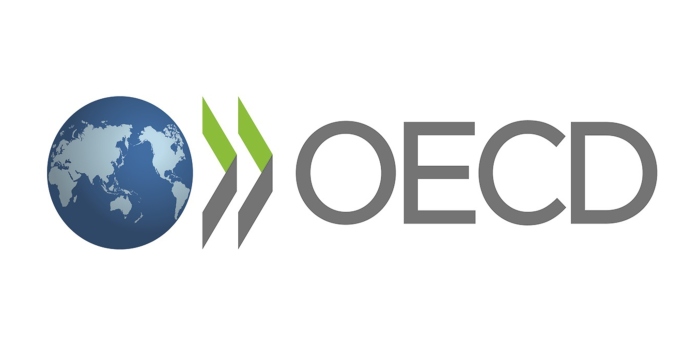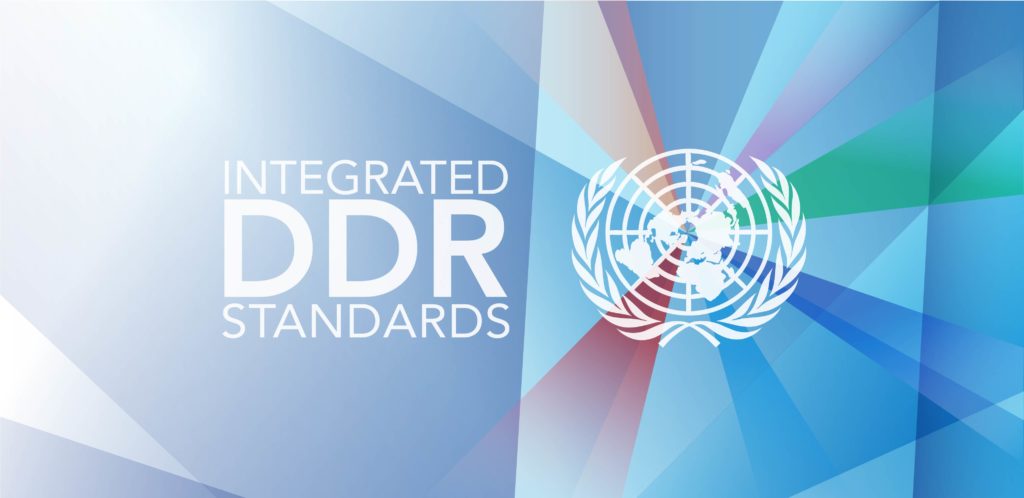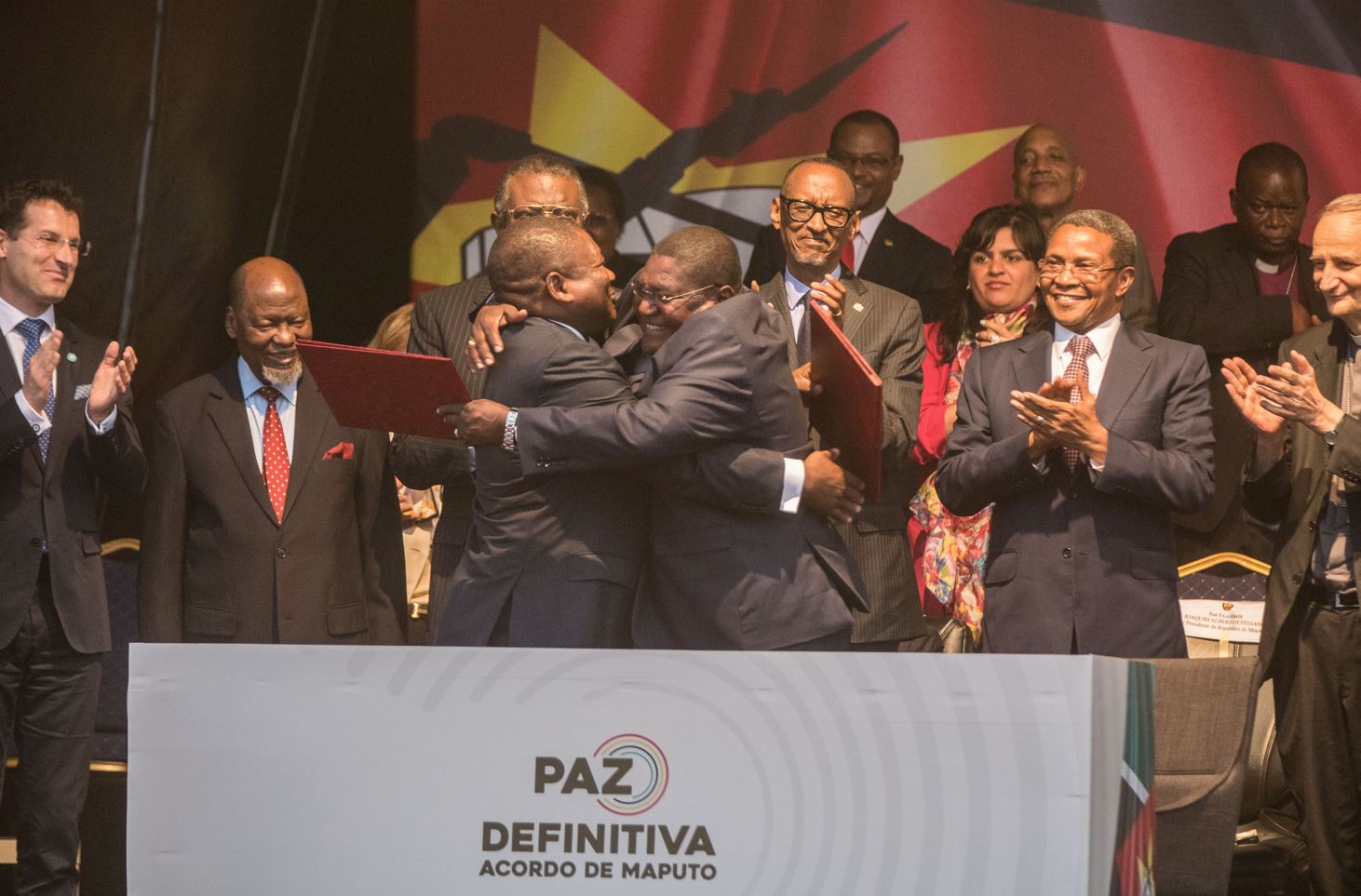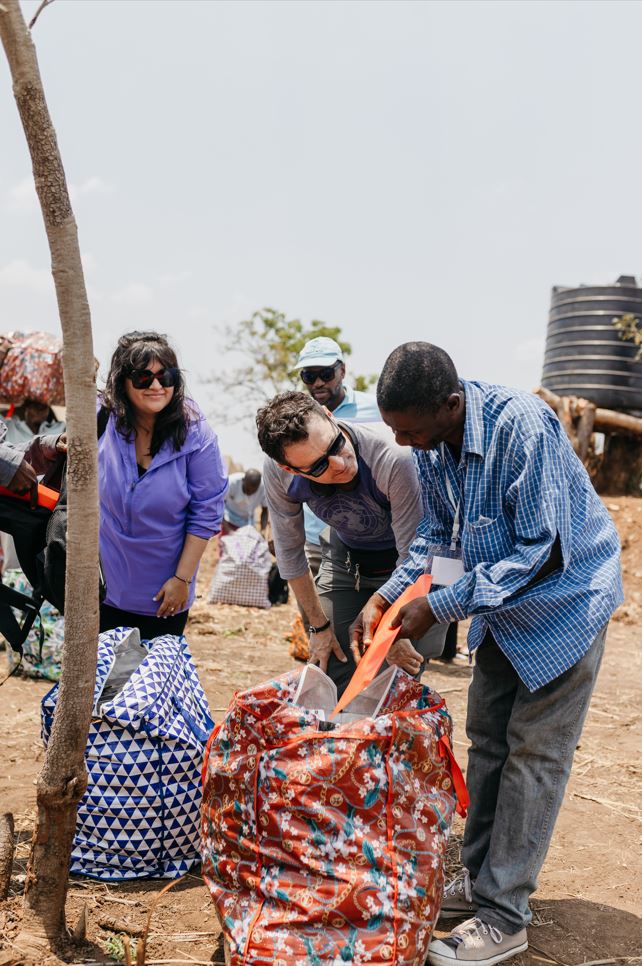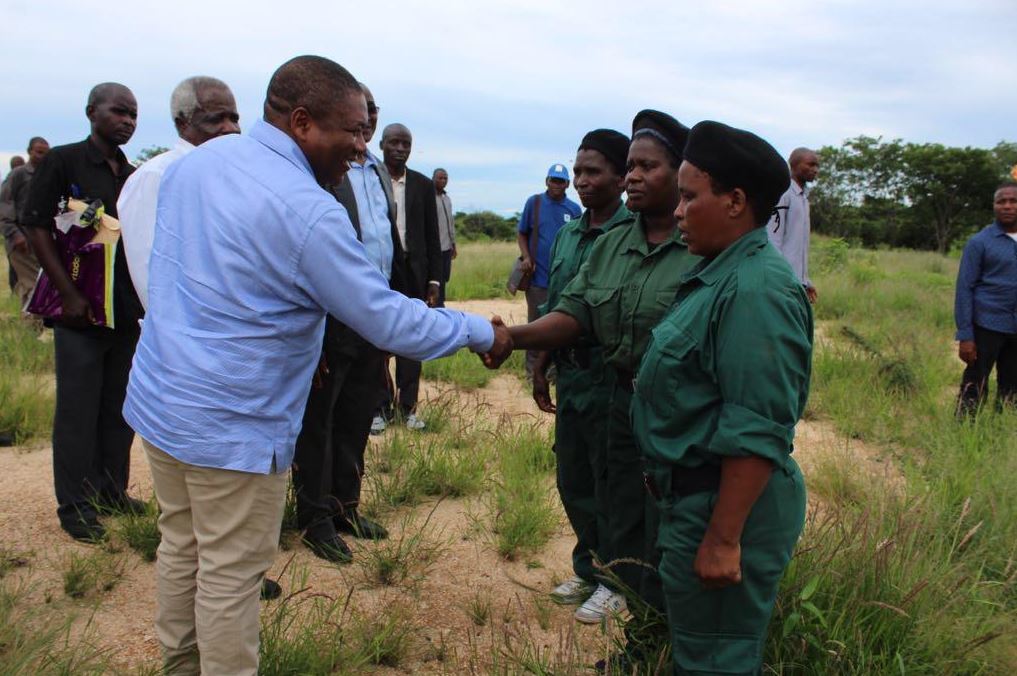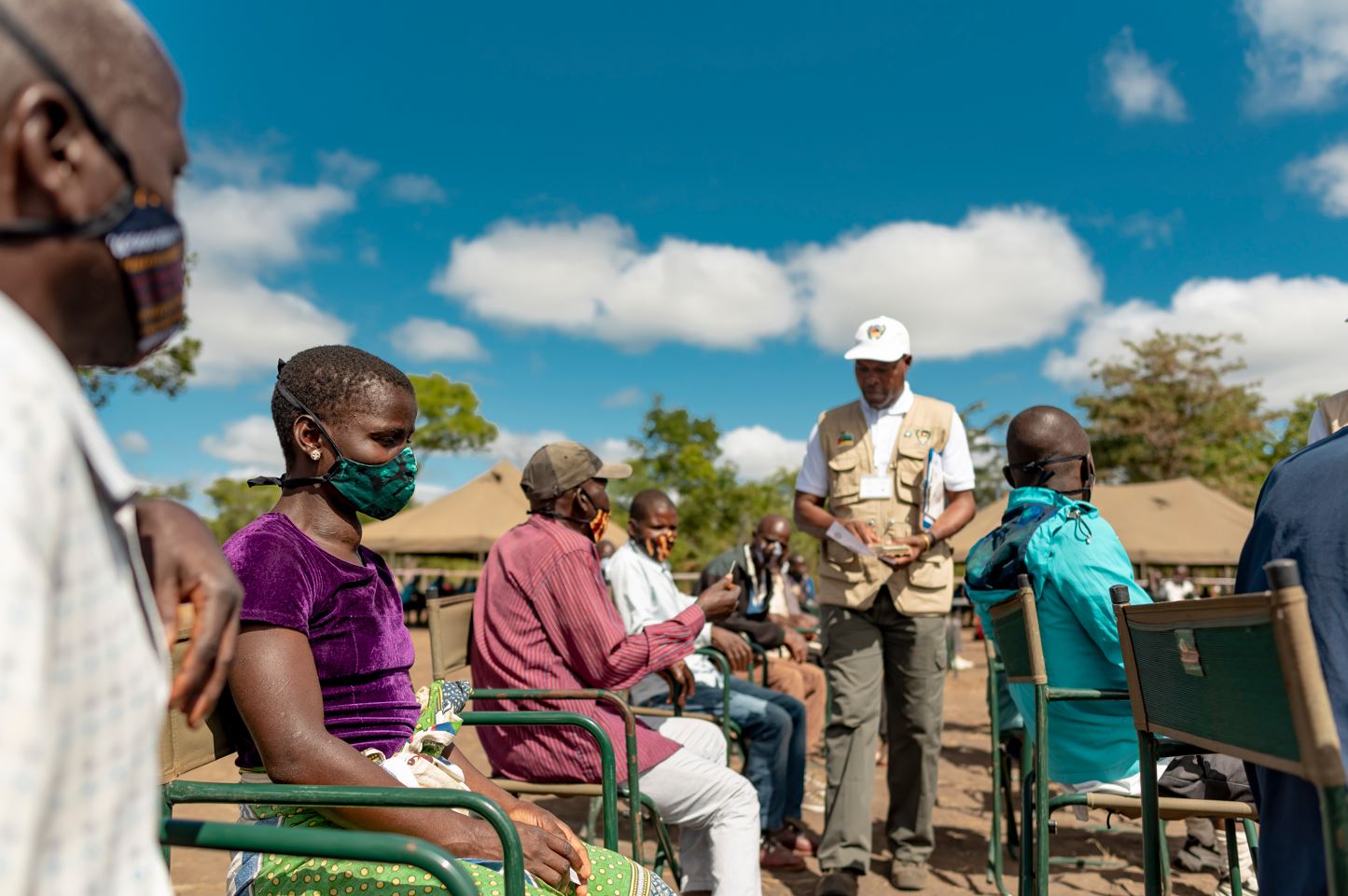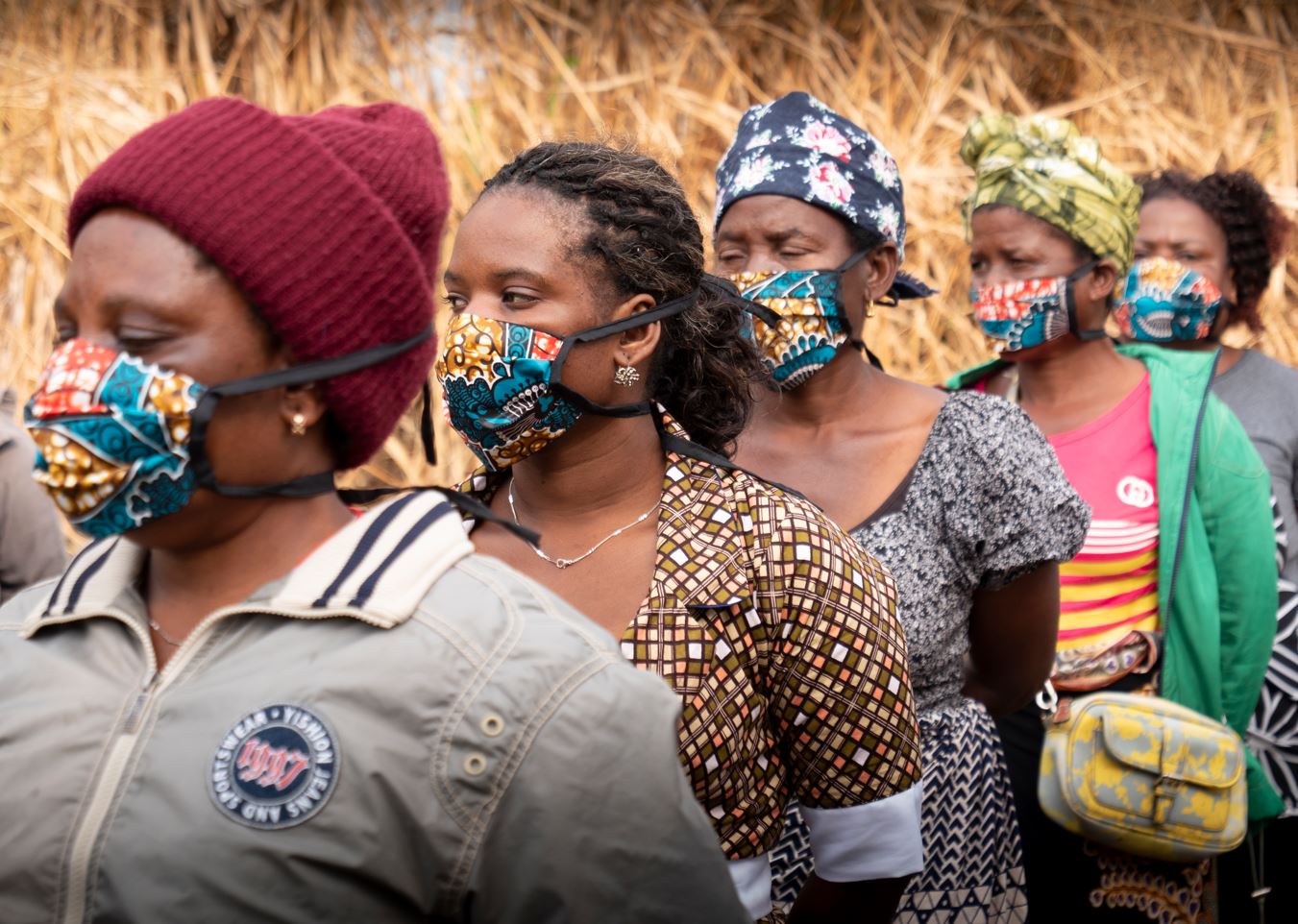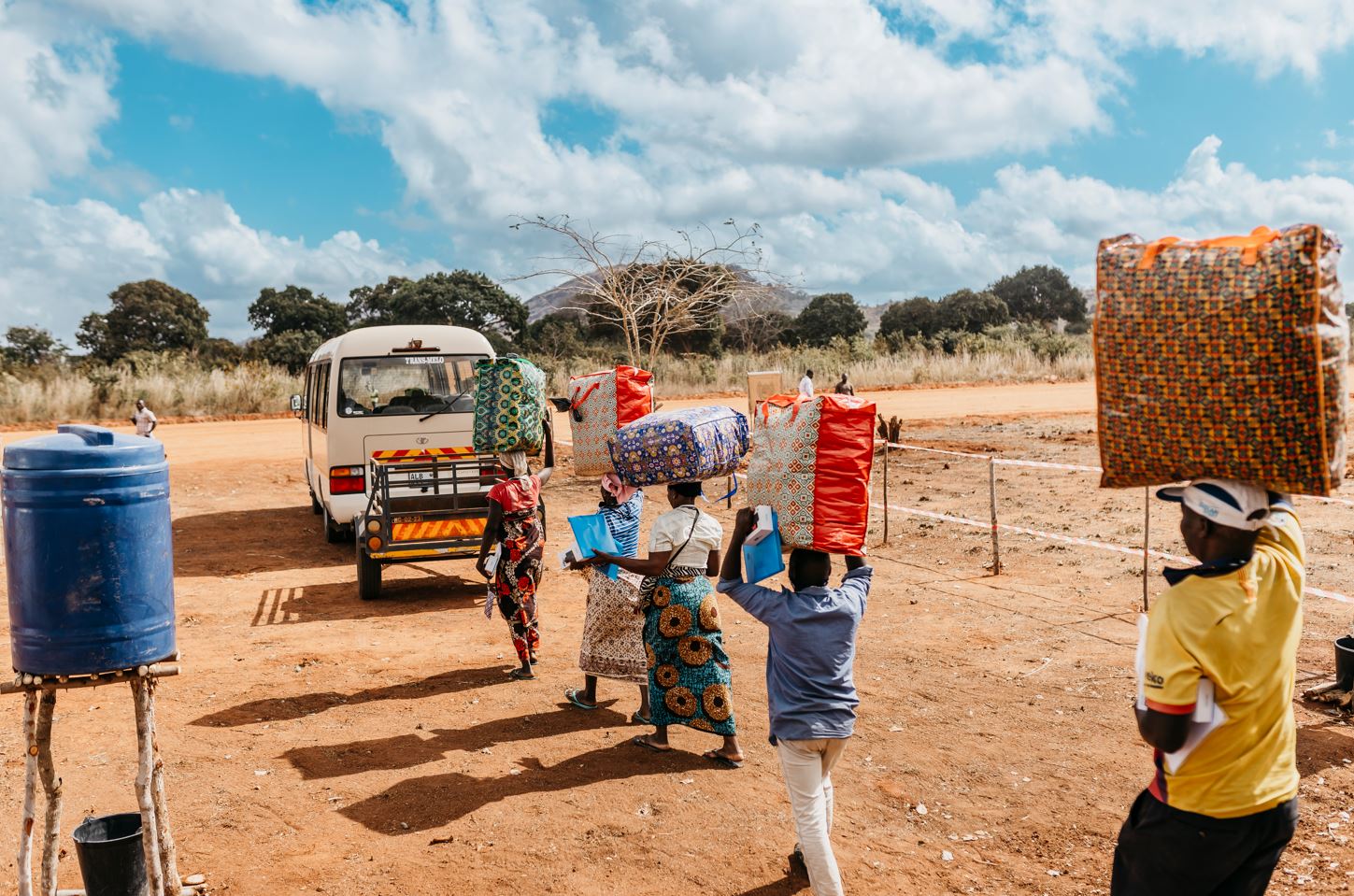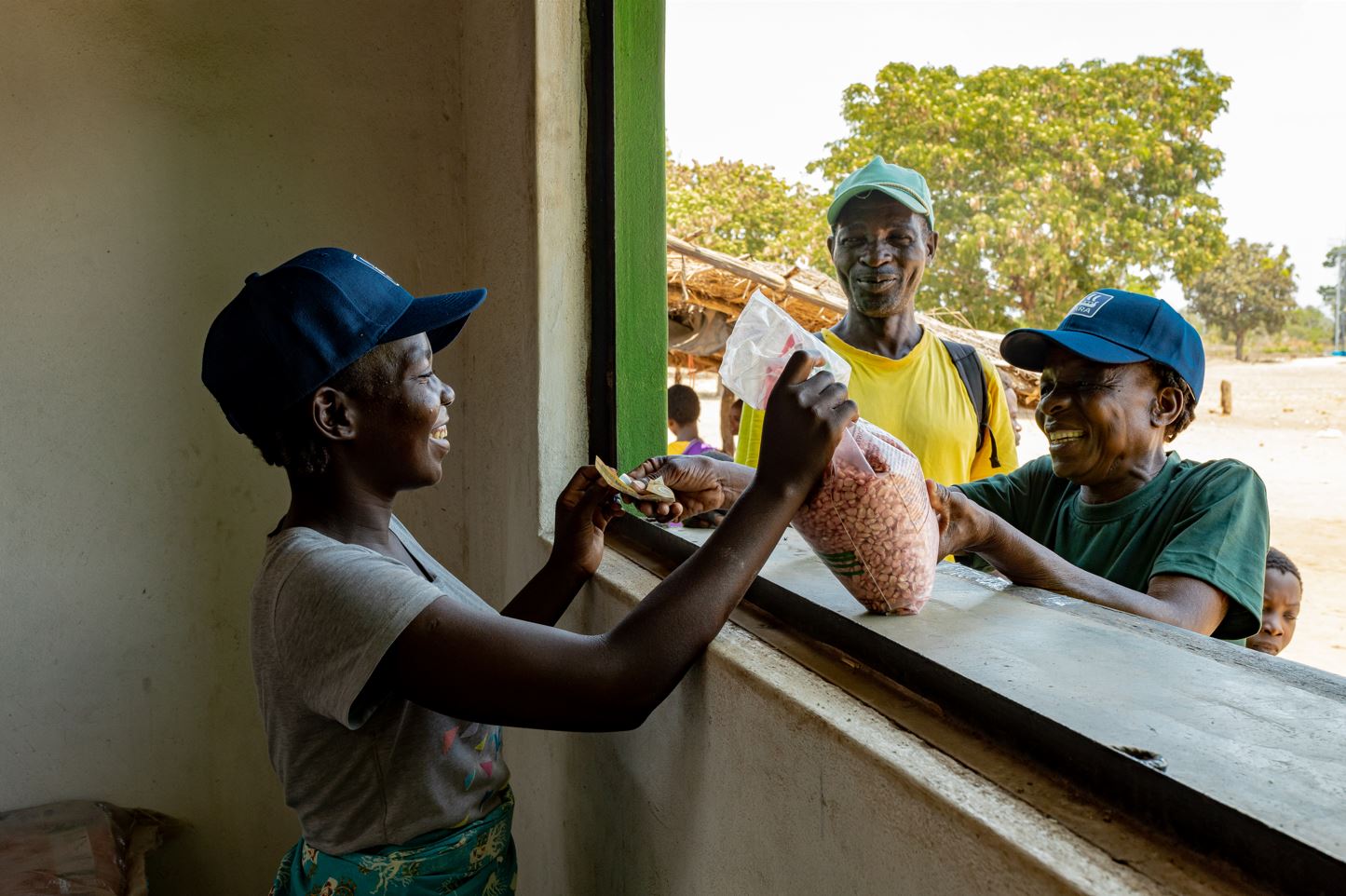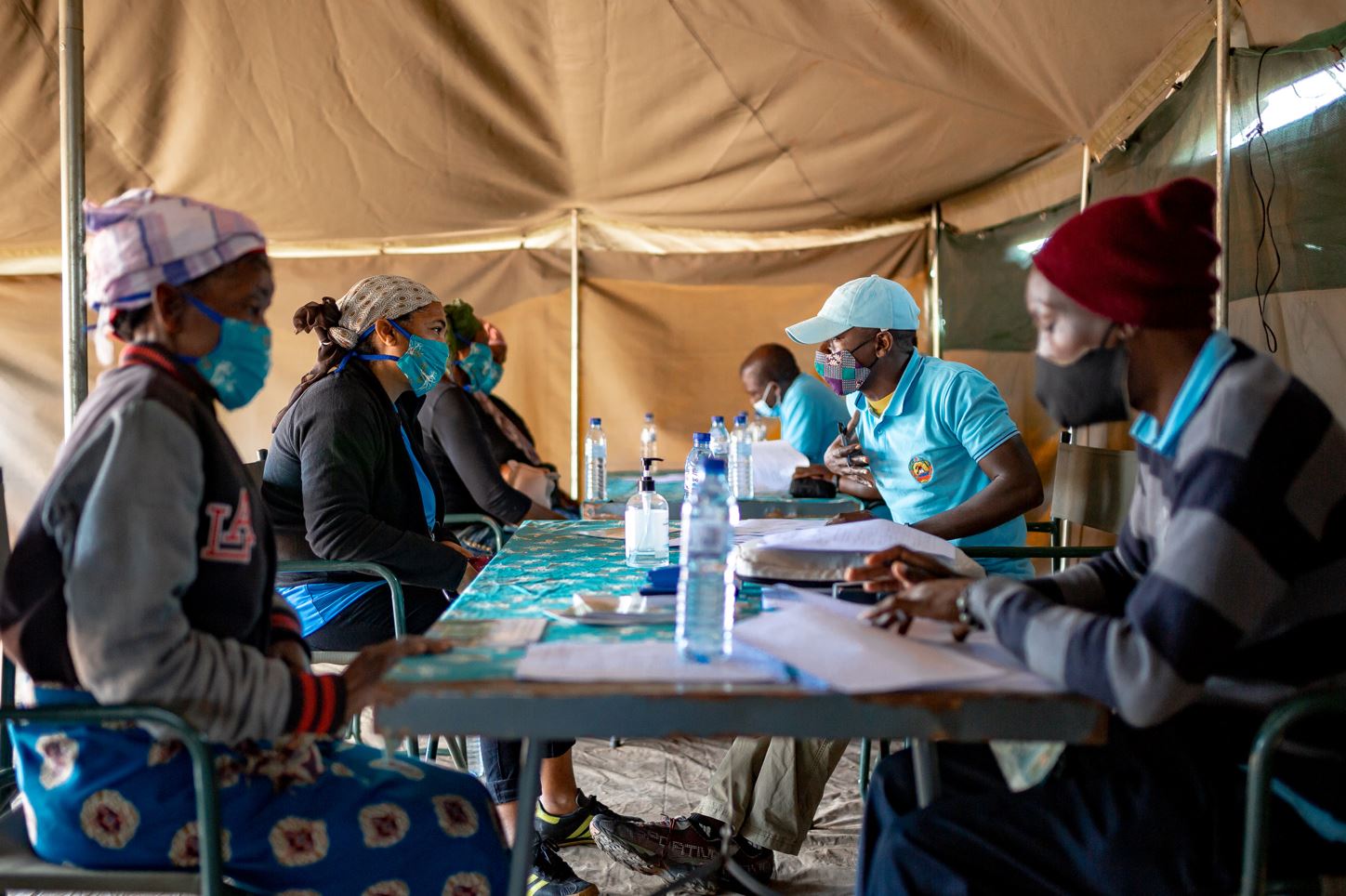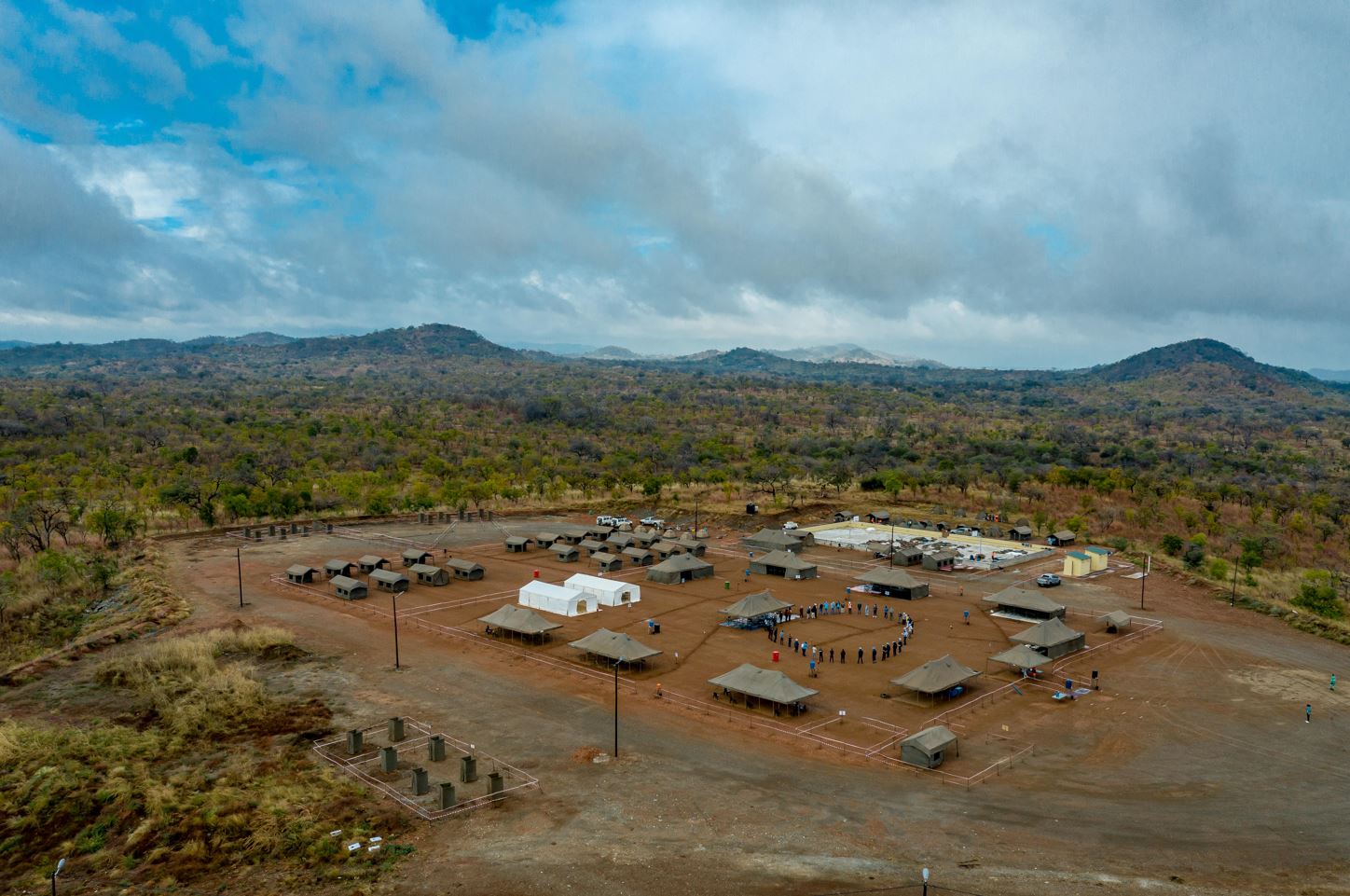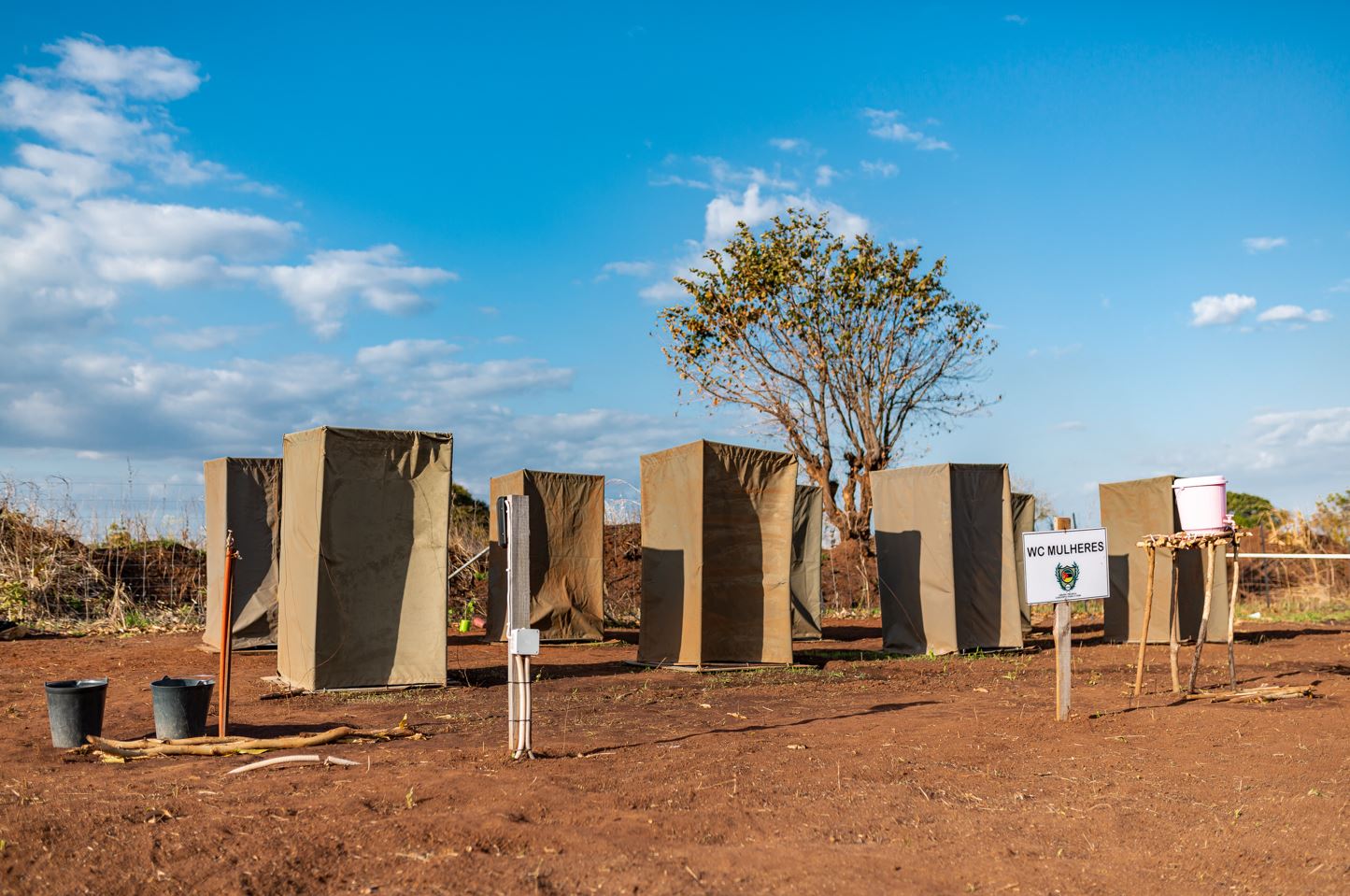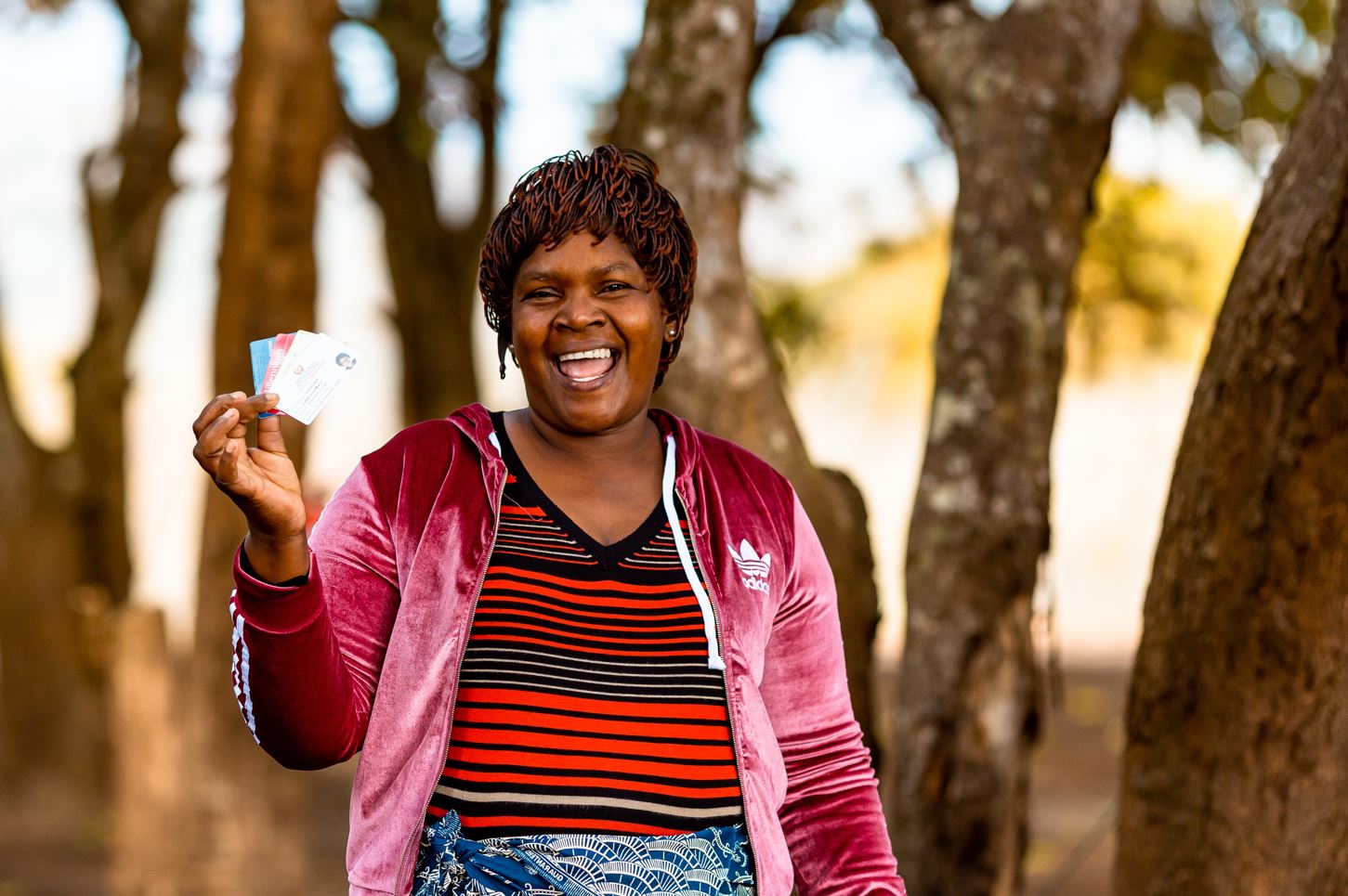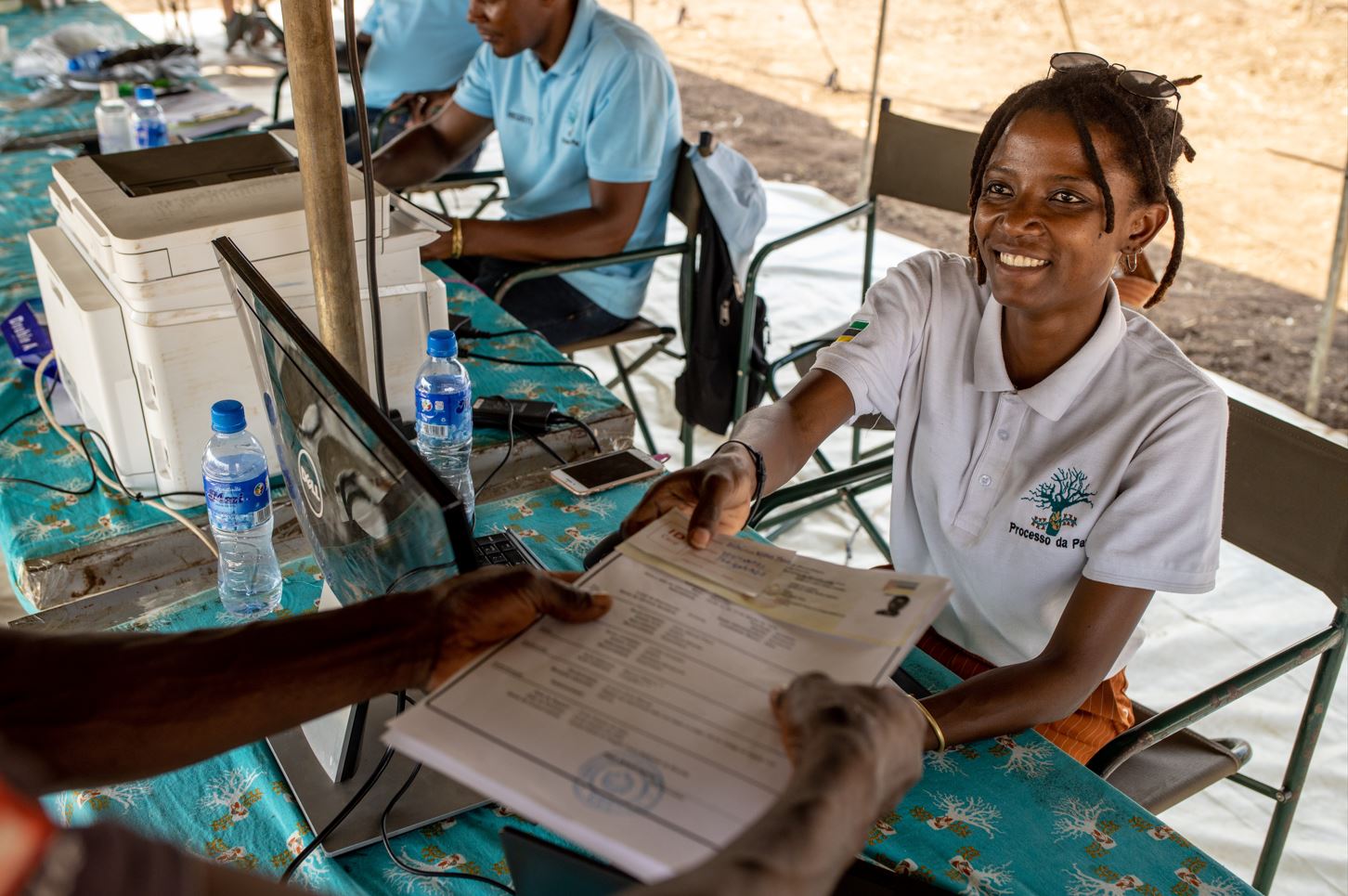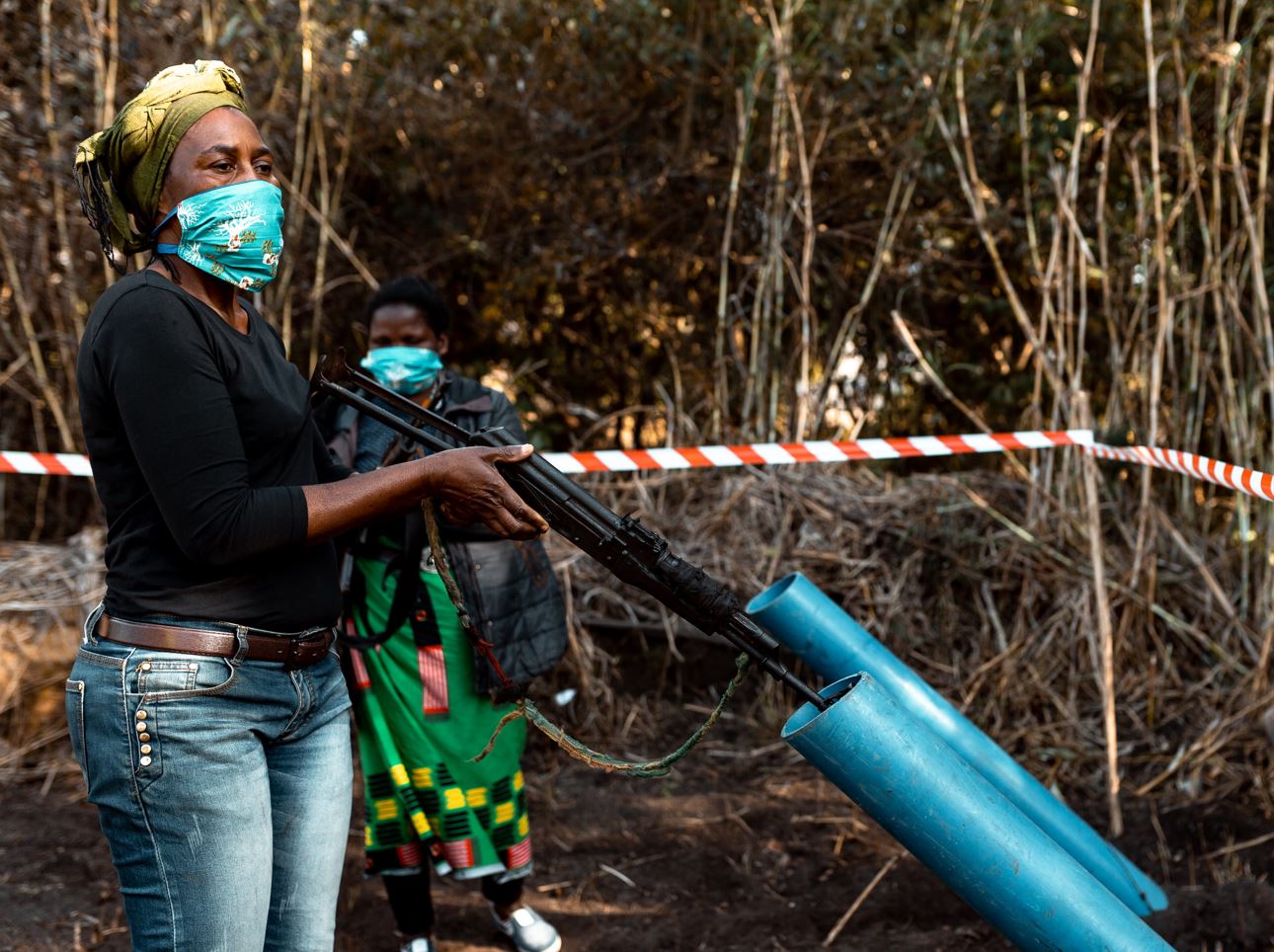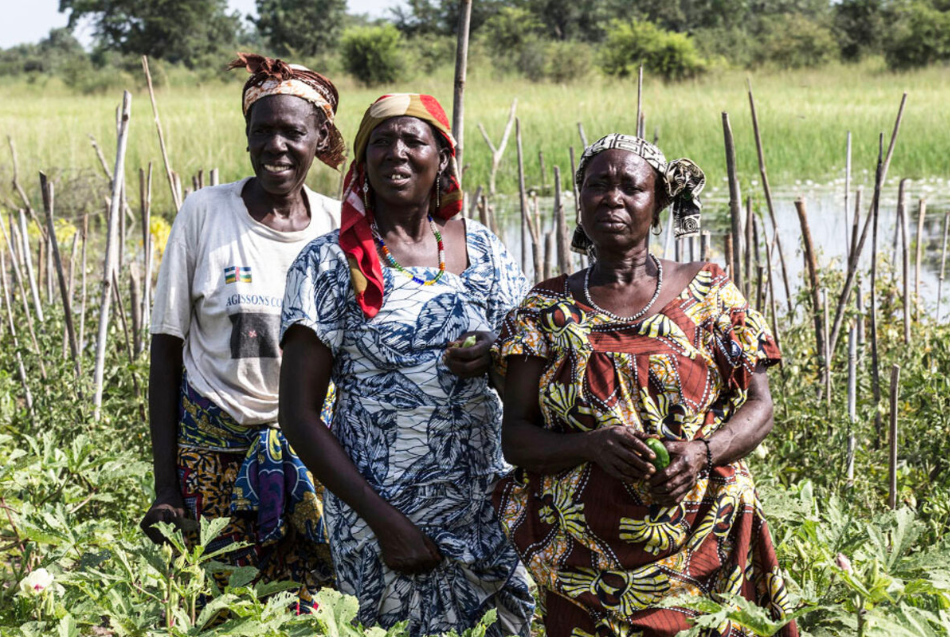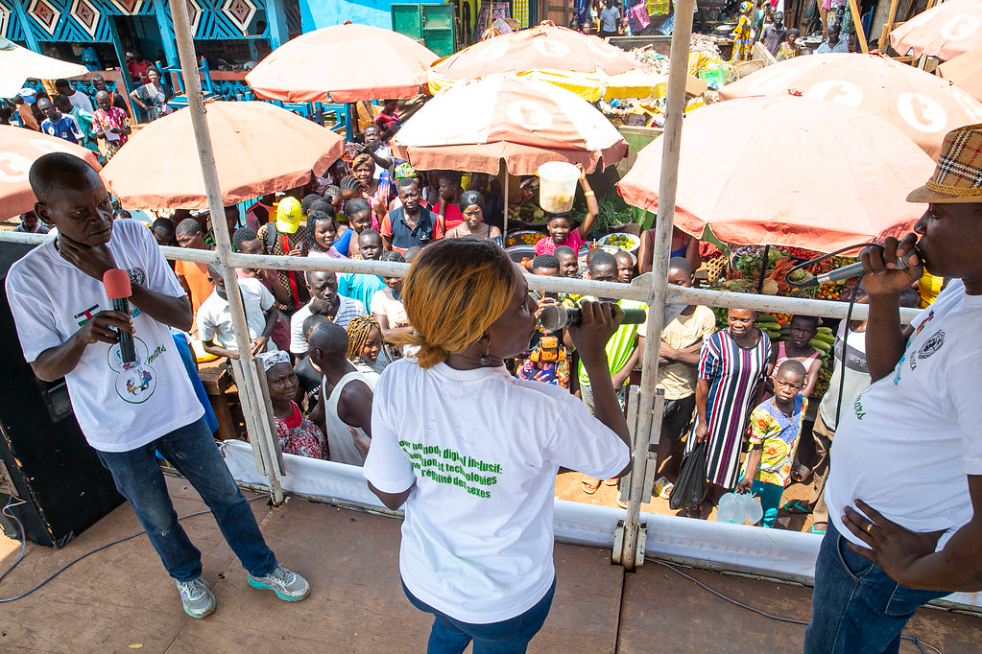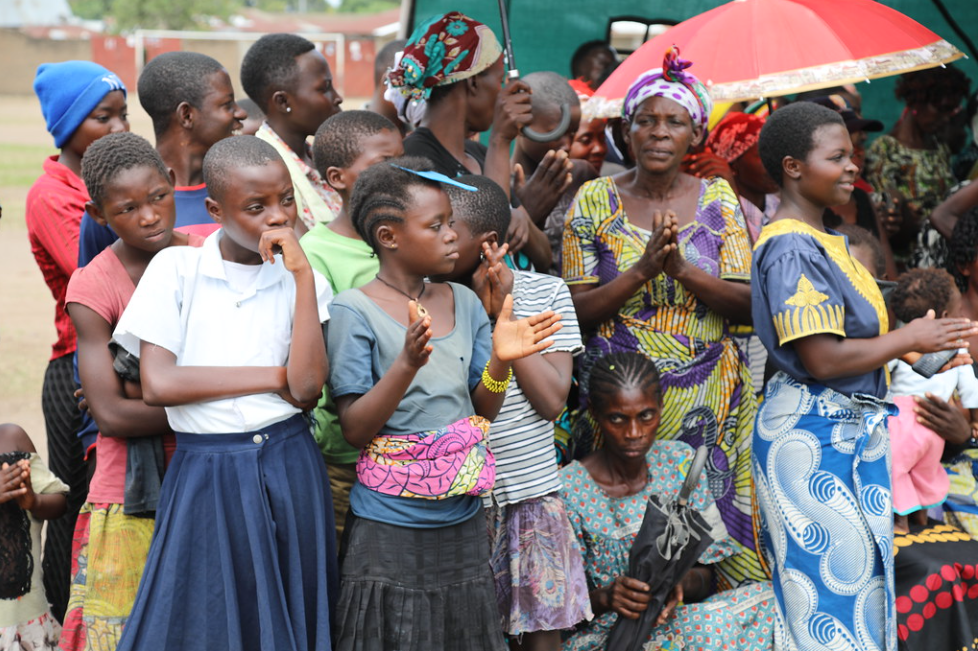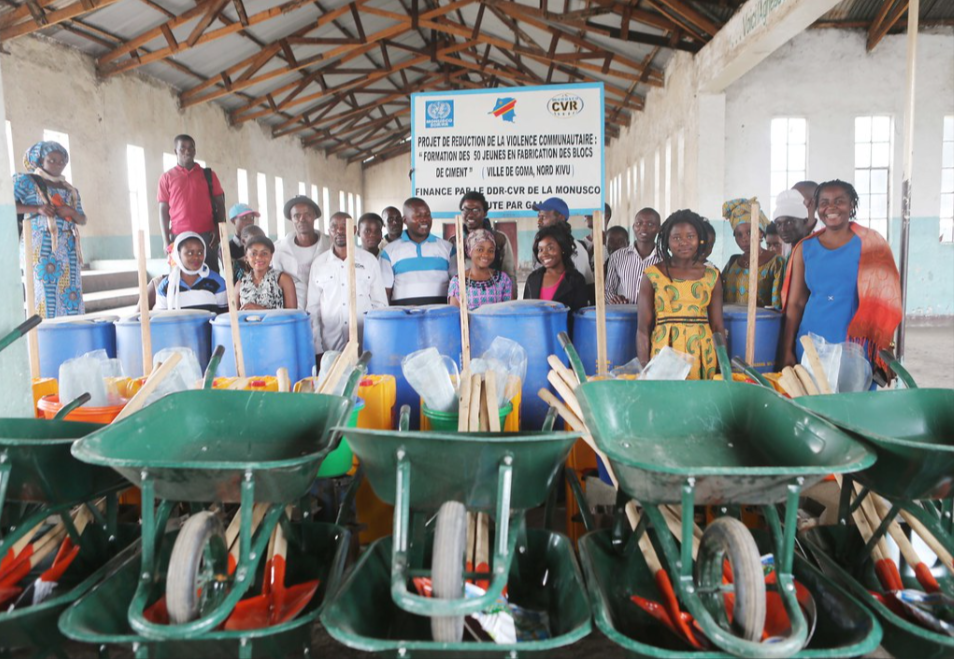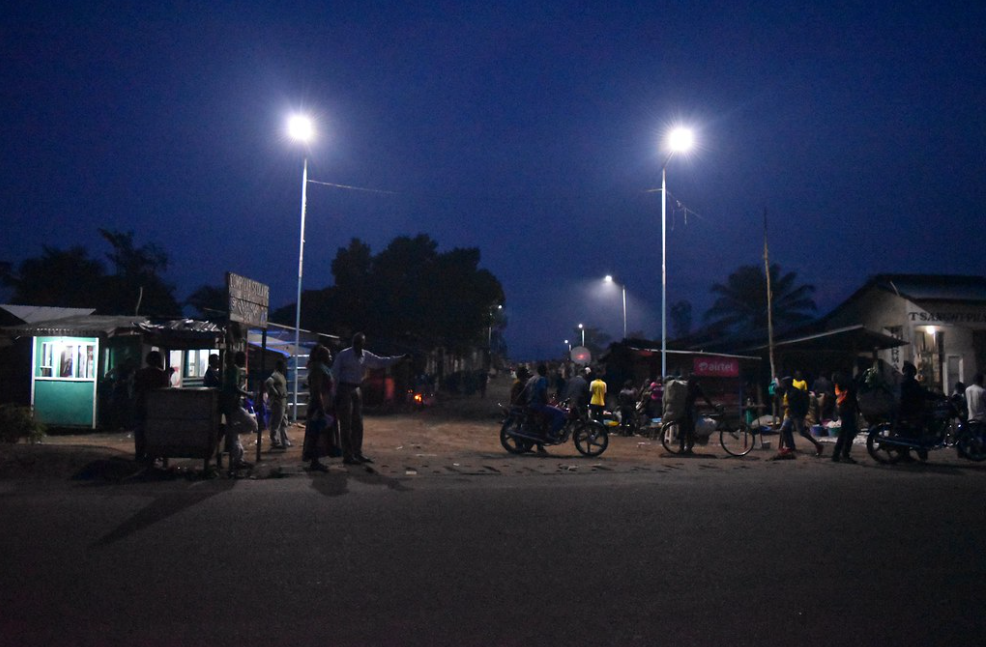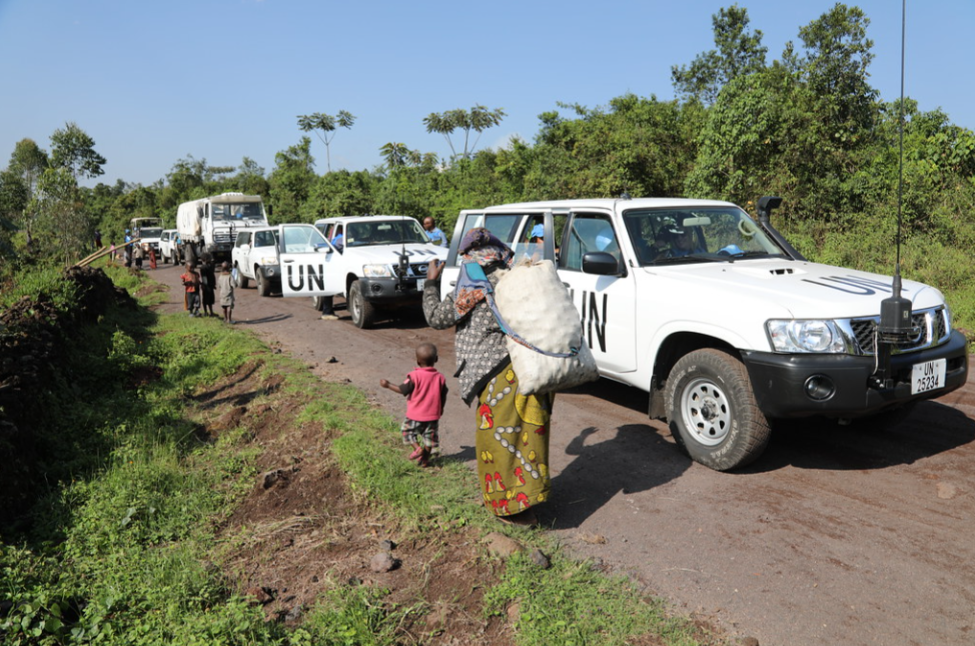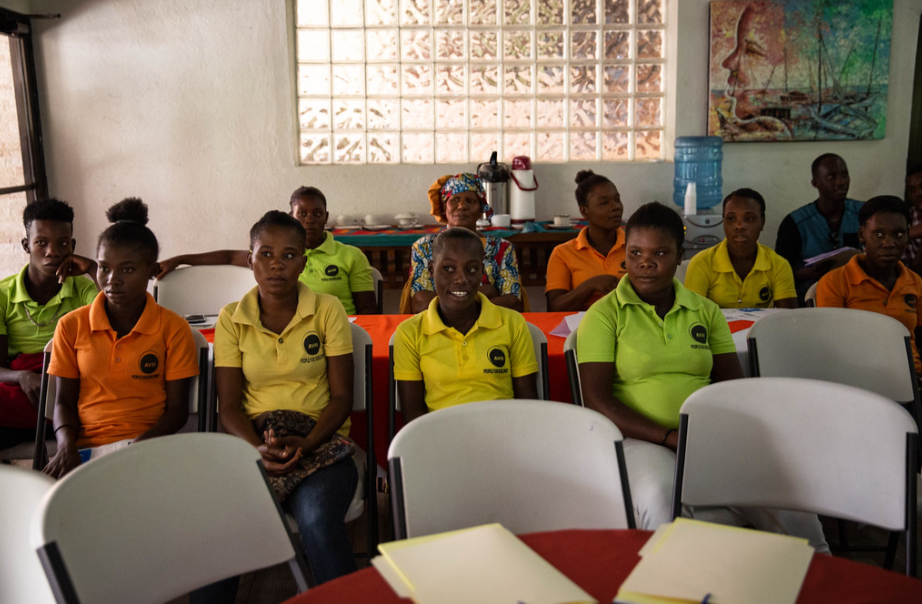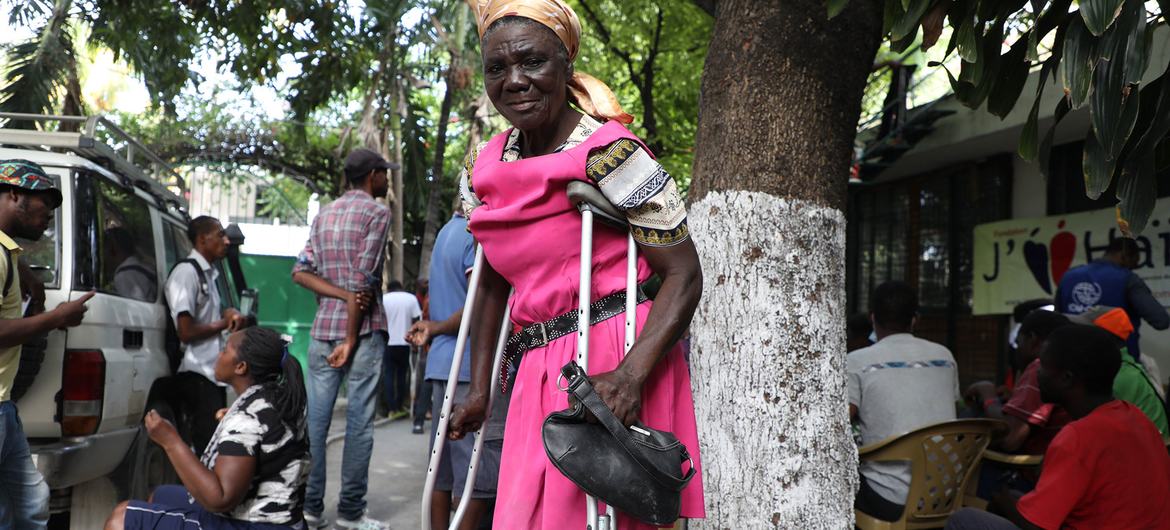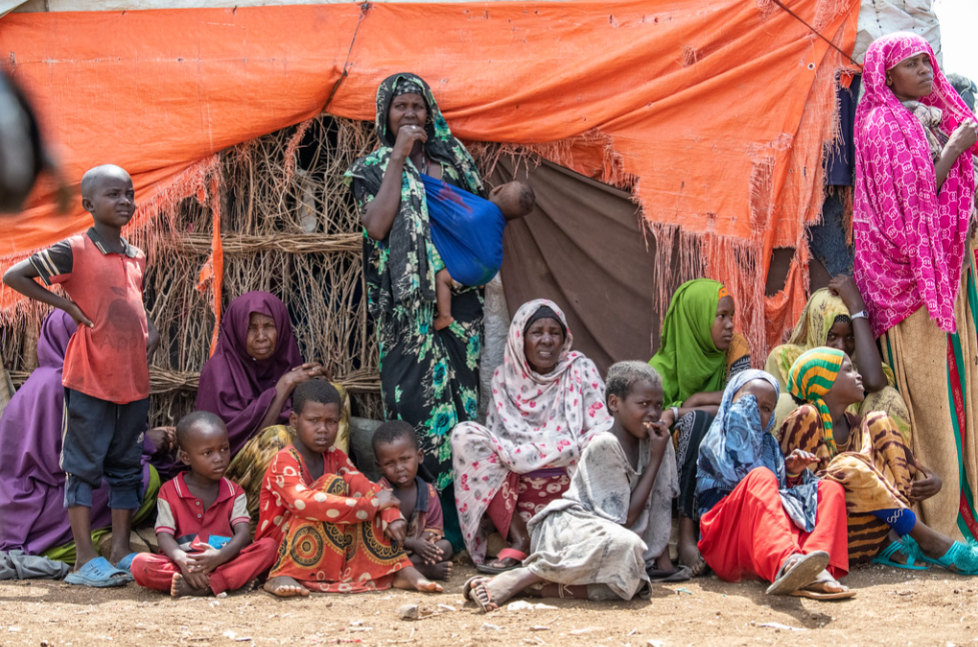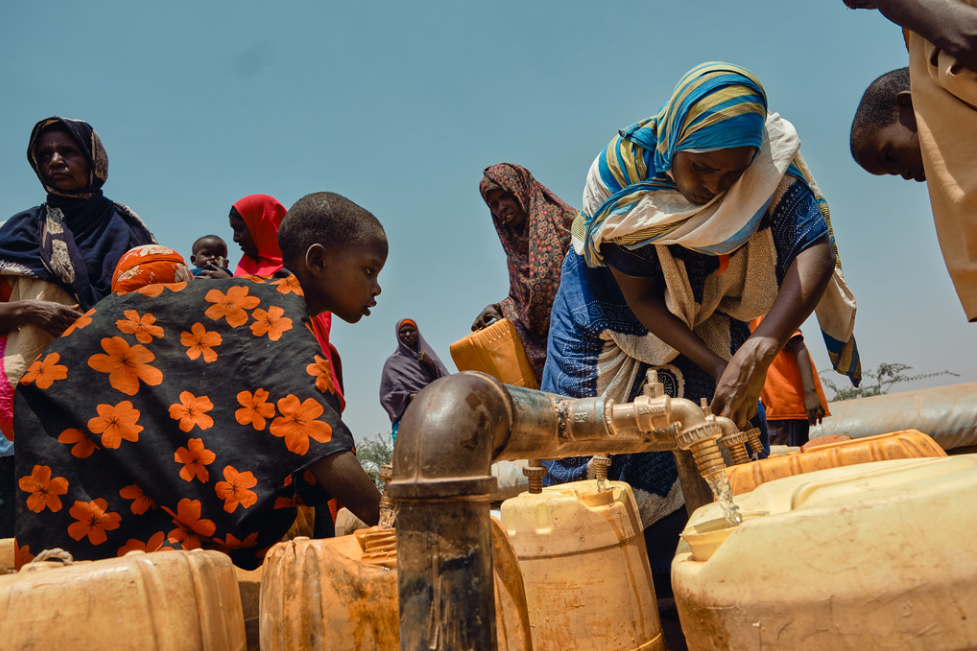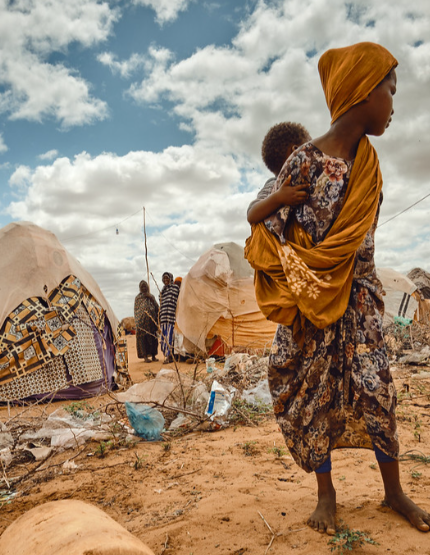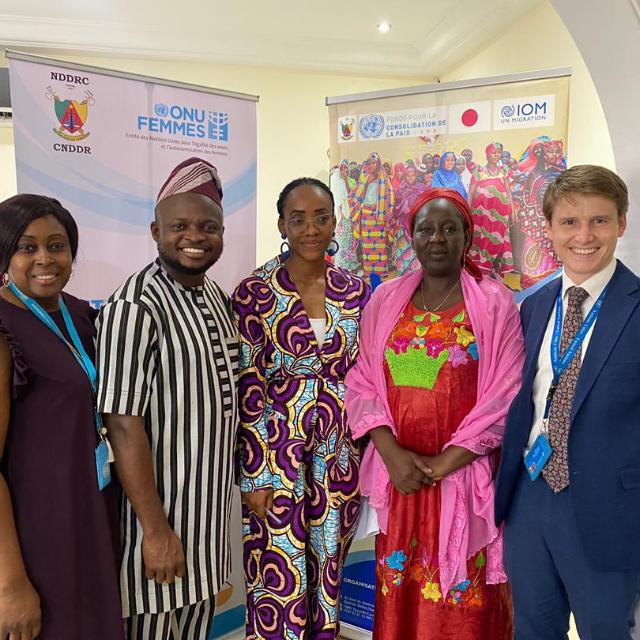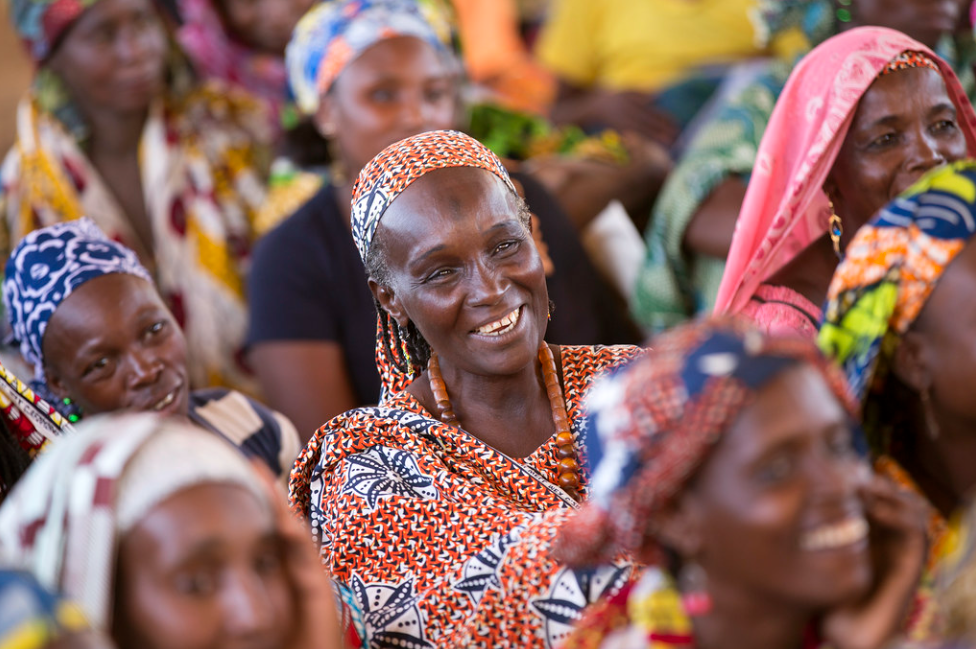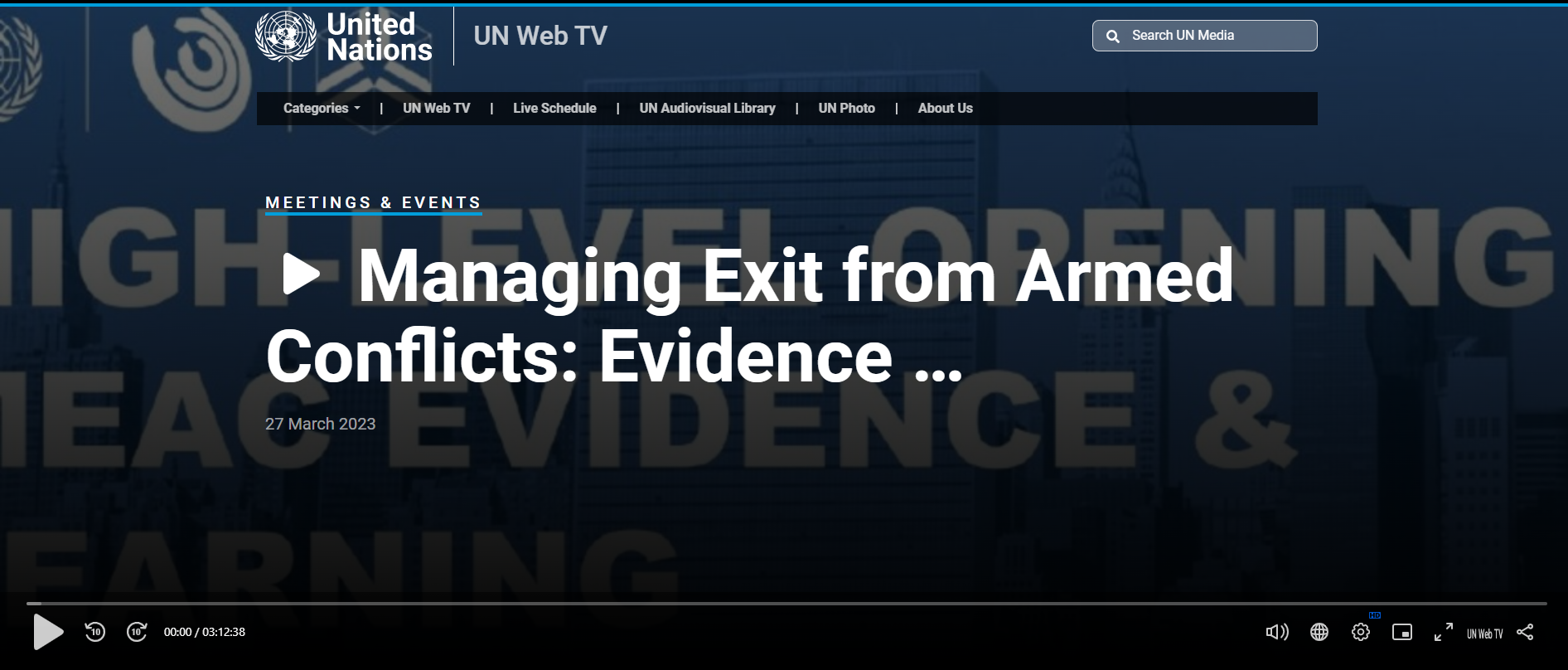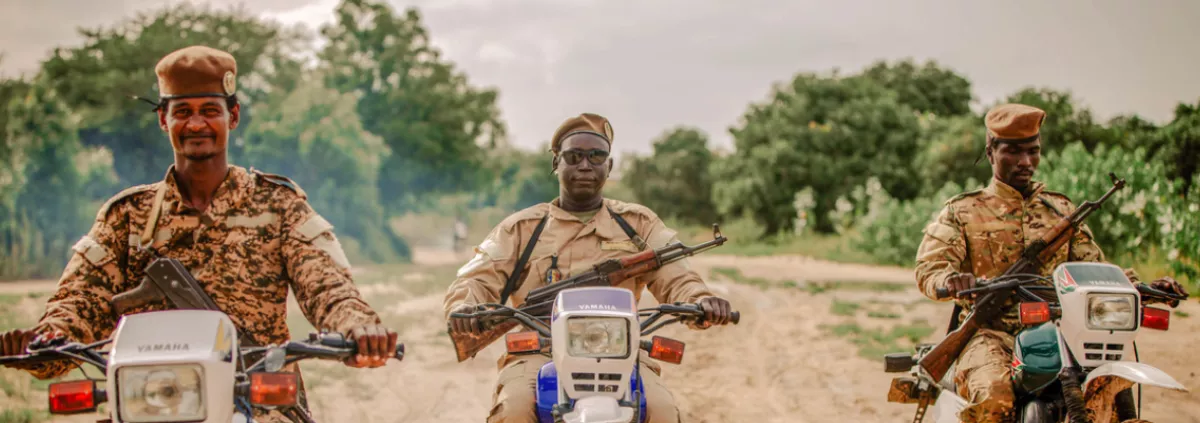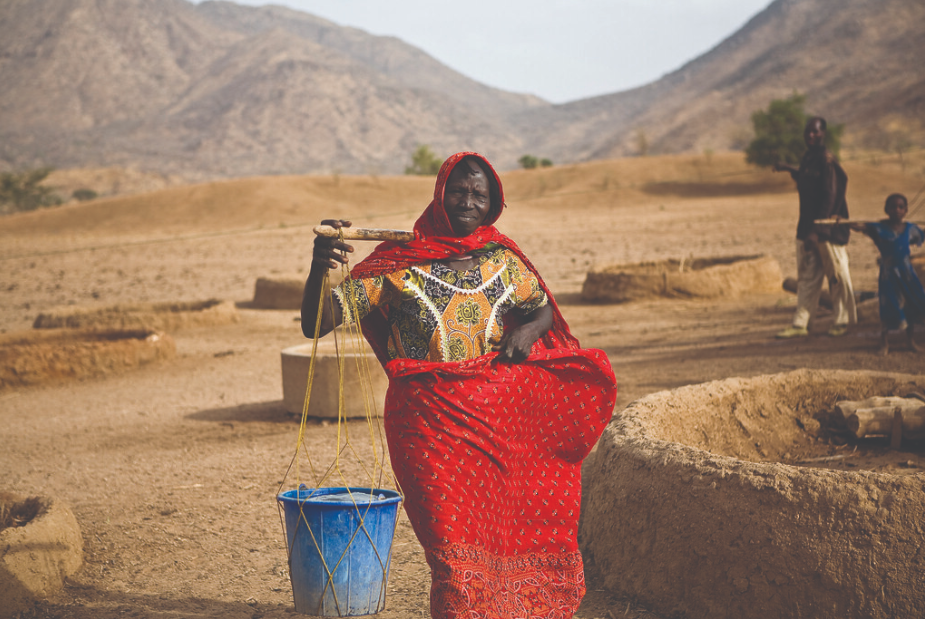
issue number 1 / 2023
CONTENTS
In Focus:
Gender-responsive DDR
2.
Managing Exits from Armed Conflict
3.
Regional dimensions of DDR
4.
Field updates
5.
Introduction of new staff members
6.
IDDRS Updates
7.
Recent publications
8.
Upcoming events and trainings
Gender-responsive DDR
Importance of gender-responsive DDR
From former combatants to peacebuilders, women fulfill a wide set of roles in the effective implementation of Disarmament, Demobilization and Reintegration (DDR) processes. Promoting gender-responsive DDR through meaningful participation of women at all stages of DDR is essential for the success and sustainability of interventions.
While women combatants usually represent a small percentage of demobilized caseloads, the implementation of DDR-related tools, notably Community Violence Reduction (CVR) projects, allows DDR components in peace operations to mobilize and empower women towards mitigating local conflict, preventing recruitment into armed groups, and building community resilience, including its capacity to absorb ex-combatants.
Remaining challenges
The implementation of integrated DDR processes should aim to address the specific needs of women and girls, as well as men and boys, taking into account their different experiences, roles, capacities and responsibilities during and after conflict.
However, the participation of women in DDR programs can be hindered by various factors such as cultural barriers, limited access to information and resources for women’s organizations, cultural and social norms that prioritize men and boys, and the continued threat of armed groups. The protection of women and girls from sexual violence in conflict also remains a significant challenge. In host communities with an influx of male DDR beneficiaries, potential challenges related to health and premature marriage were identified for women and girls.
DDR needs to be gender-responsive to make a positive contribution to peace and stability in conflict-affected communities.
The role of women in DDR
Given the diversity of functions performed by women in conflict-affected contexts, promoting gender-responsive DDR at all stages is crucial for the success and sustainability of interventions. This entails creating a protective environment, granting access to benefits and ensuring women’s meaningful participation in the assessment, design and implementation of DDR initiatives.
Select tabs 2 and 3 to find out more.
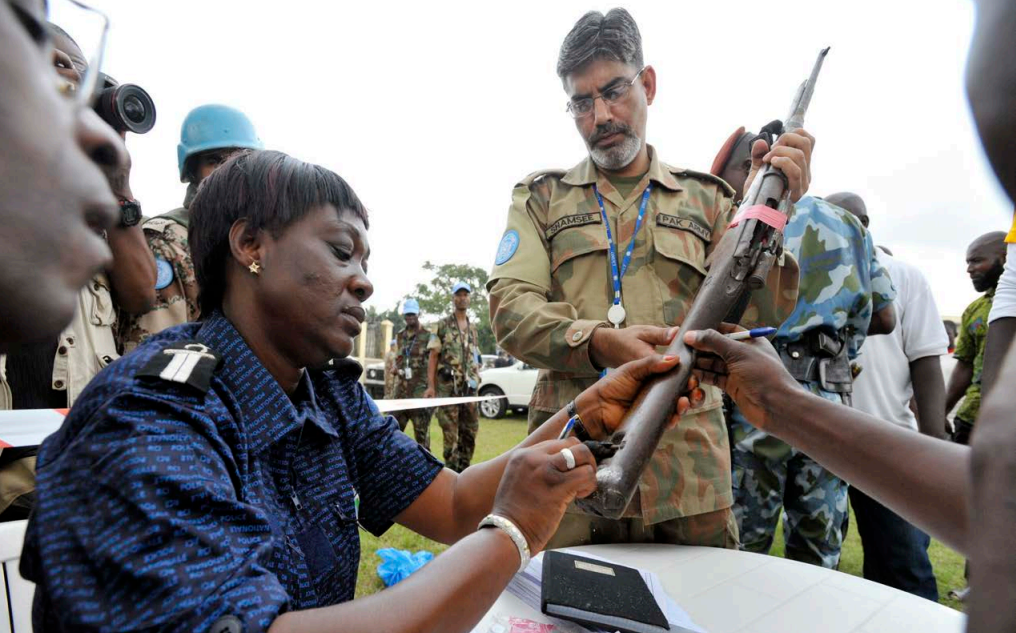
The roles of women in armed groups/forces and conflict are complex and often non-transparent.
While women and girls in armed groups participate as armed combatants, they also perform other functions, by choice or coercion.
In DDR processes, women beneficiaries are often categorized in three groups:
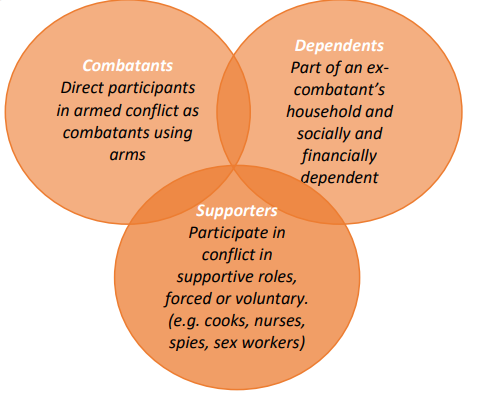
As peacekeeping has evolved to reflect the populations we serve, women have become increasingly part of the peacekeeping family – making operations more effective.
Find out more on the UN website.
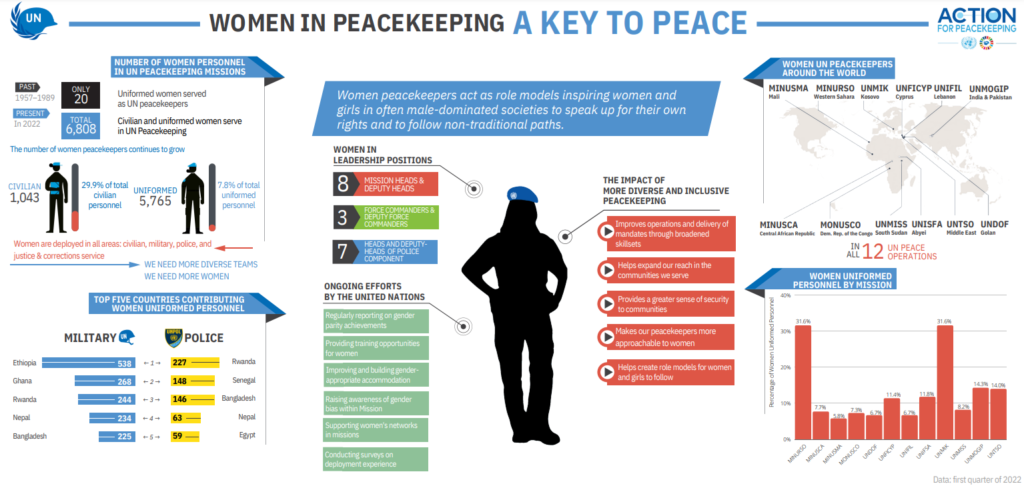
What does gender-responsive DDR mean in practice?
Figure in IDDRS 5.10 “Women, Gender and DDR”
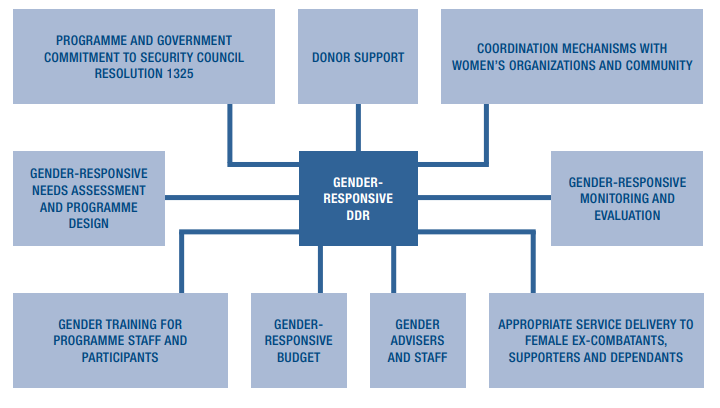
Find out more about Gender and DDR
IDDRS Module on "Women, Gender and DDR"
The Integrated DDR Standards Module on “Women, Gender and DDR” offers policy guidance on gender aspects of the various stages in a DDR processes and outlines gender-aware interventions to ensure equitable and sustainable programs.
It also provides guidance on mainstreaming gender into all DDR policies and programs to create gender-responsive DDR programs.
A revised version of this module will be published soon.
See full module
UN Security Council Resolution 1325
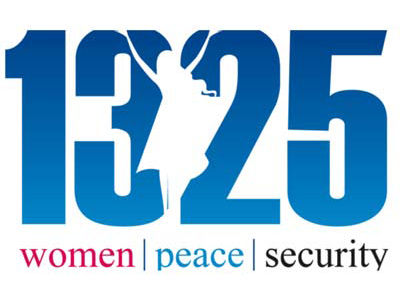
UN Security Council Resolution 1325 (2000) calls for gender awareness in all aspects of peacekeeping initiatives, especially demobilization and reintegration, urges women’s informed and active participation in disarmament exercises, and insists on the right of women to carry out their post-conflict reconstruction activities in an environment free from threat, especially of sexualized violence.
Read the Resolution
UN policy document: Gender Responsive United Nations Peacekeeping Operations
This Policy (2018) provides guidance on how to operationalize gender equality and the Women, Peace and Security (WPS) mandates, as guided by Security Council Resolutions.
On DDR, it states that “Disarmament, demobilization and reintegration (DDR) shall address the specific needs of women in accordance with DDR policies, guidelines and procedures. The initiatives shall be informed by gendered analysis and sex and age disaggregation of data. The initiatives shall include recognition of the category of women associated with armed forces and groups (including as supporters and dependents), as their diverse roles such as, ex-combatants.
DDR initiatives shall adopt gender responsive approaches and develop gender-specific interventions, aimed at supporting the sustainable reintegration of women and men ex-combatants and their dependents. DDR shall support and enable the participation of women in community-based projects, including in Community Violence Reduction [CVR] projects) to empower them and promote social cohesion. Interventions shall aim at promoting capacity building and strengthening their role in decision-making processes.”
Read the UN guidance
UN Call to Action: Women Transforming Peace And Security
In his 2020 Call to Action on Women, Peace and Security in peacekeeping contexts, the Secretary-General called upon peacekeeping partners, including Governments, the United Nations System, regional organizations and the civil society to take bold actions to translate WPS commitments into reality.
Call to Action
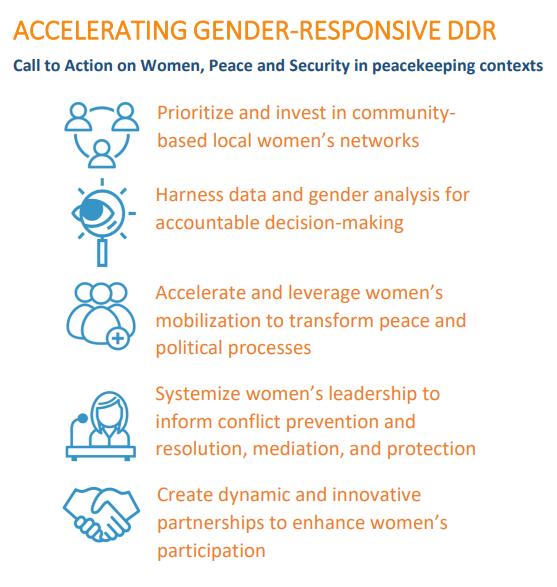
Only 38% of negotiators are women, only 6% of mediators are women, and only 6% of signatories are women. We can’t go on like this—the moment that parties come together to negotiate a political solution, women should be involved.
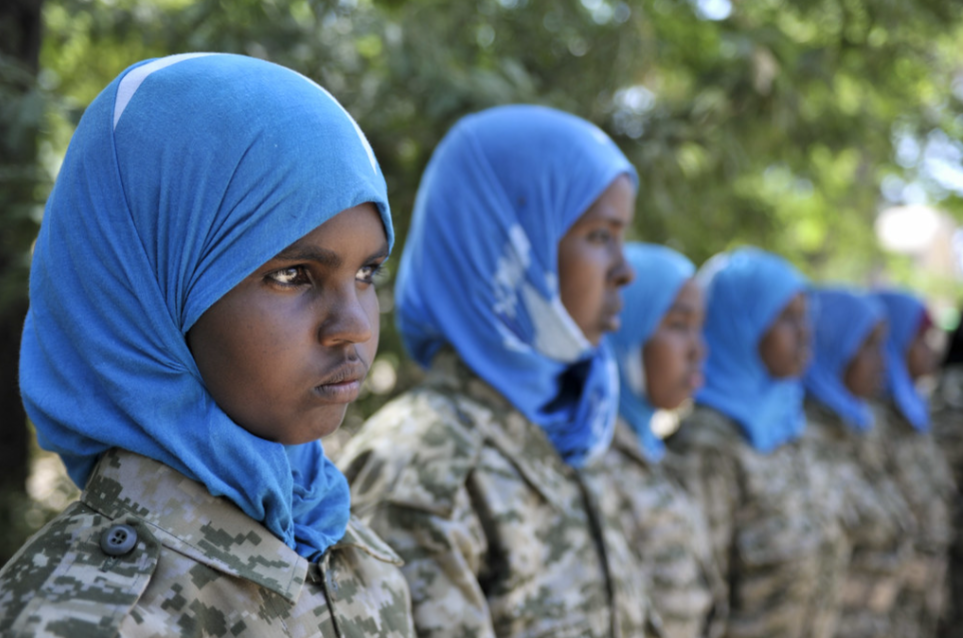
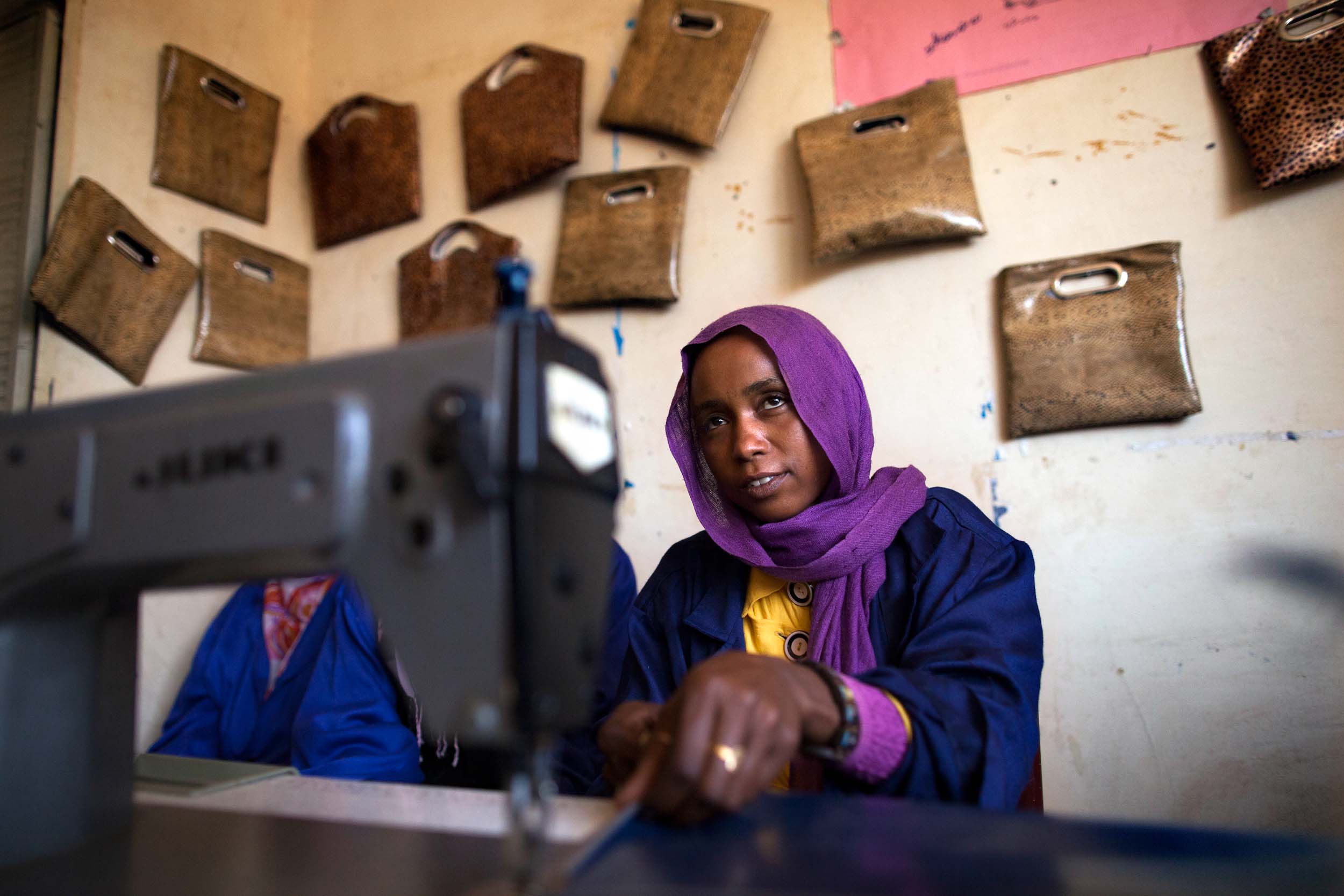
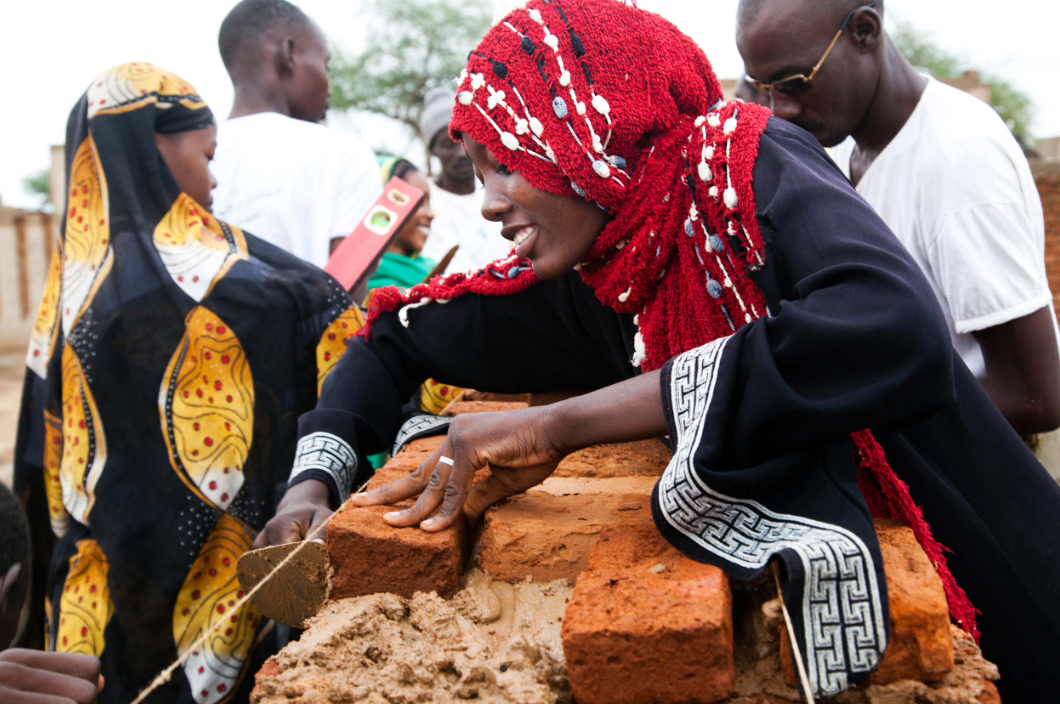
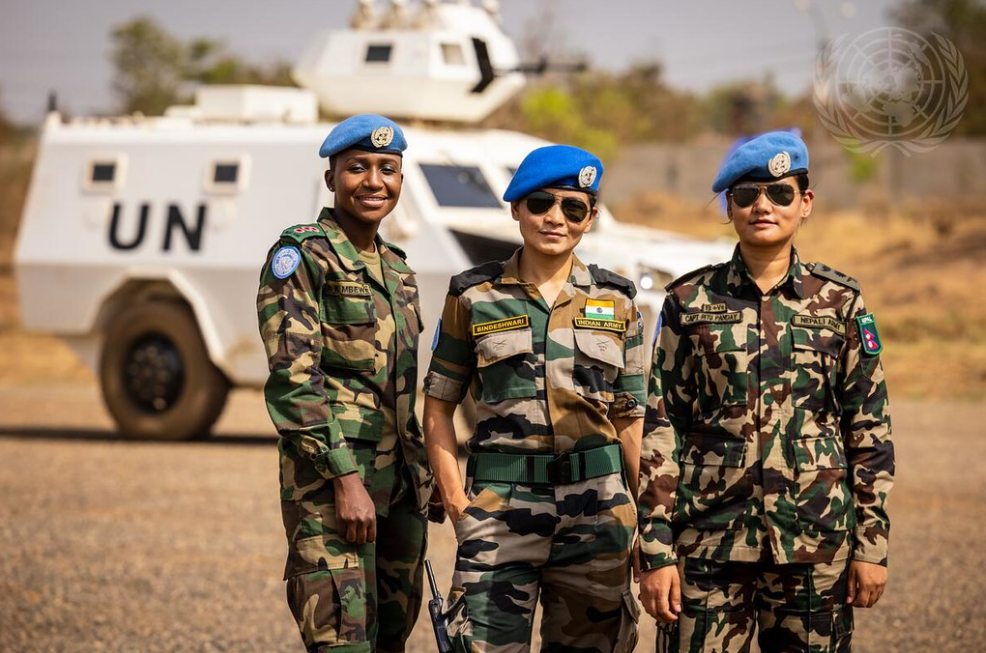
Projects in the field
As noted by the Secretary General in October 2022, the UN has continued to support the design of inclusive and gender-responsive DDR processes and CVR projects.
Several peace operations established a minimum gender quota for beneficiaries of CVR projects and promoted gender-sensitive eligibility criteria for DDR processes. The percentage of women beneficiaries of CVR and DDR projects varies. In Mali, 50 per cent of the beneficiaries of CVR projects were women, but only 23 per cent in the Democratic Republic of the Congo. In Colombia, 74 per cent of women former combatants participate in productive projects, although they still face challenges related to a lack of inclusion in decision-making and an increasing caregiving burden.
Mozambique
Non-mission setting
One of the cornerstones of the DDR process in Mozambique has been putting people at its centre. Conscious that women bear a disproportionate burden from conflict, and that their full, equal and meaningful participation is required for the sustainability of peacebuilding, the Parties have championed a gender-sensitive approach to the whole process. The disarmament and demobilization phase of the DDR process in Mozambique has advanced significantly, with 4,884 former Renamo combatants, including 158 women, demobilised and back in their communities.
The DDR process in Mozambique has taken into account women’s specific needs by:
1) Integrating and monitoring gender in demobilization and disarmament activities
-
DDR beneficiaries complete individual reintegration surveys
-
Women undergo separate interviews to understand their specific needs and experiences
-
Reinsertion packages are tailored to women with gender-appropriate materials
-
The impact of DDR on women and girls is monitored through follow-up calls and visits
-
The Office of the Personal Envoy in partnership with the Folke Bernadotte Academy (FBA) has provided training to strengthen gender-sensitive DDR approaches
2) Tailoring and fostering reintegration opportunities for women, girls and communities
-
Gender-analysis developed for future DDR activities and reintegration process
-
Challenges faced by female DDR beneficiaries identified in areas such as education, health, social norms, and access to resources
-
Potential challenges related to health and premature marriage identified for women and girls in host communities
-
Reintegration framework developed for gender-sensitive interventions, with a focus on economic, social, and psychosocial processes
-
Reintegration opportunities tailored for women with specific needs and interests in mind.
Central African Republic (MINUSCA)
Democratic Republic of Congo (MONUSCO)
Haiti (BINUH)
Somalia (UNSOM)
Cameroon
Non-mission setting
Managing exits from armed conflict
MEAC Project
The Managing Exits from Armed Conflict (MEAC) project is an “All of UN” collaboration that seeks to create a shared, robust evidence base around conflict exits that can inform how the UN designs and implements prevention and reintegration interventions.
MEAC’s research and assessments support programming efforts in the Lake Chad Basin, Iraq, and Colombia to prevent armed conflict and build peace. The UN Department of Peace Operations (DPO) has been a proud supporter and partner of the MEAC initiative since its inception, helping inform the project’s direction and expand its impact.
MEAC Evidence & Learning Conference
A conference held in March 2023 in New York marked an important milestone in advancing discussions on how empirically based cross-sector approaches to conflict prevention and resolution can build on existing tools and capacities to be more effective.
This multi-day conference was the culmination of four years of innovative, multi-method studies by MEAC on pathways in and out of armed groups in the Lake Chad Basin, Colombia, and Iraq, and brought together a wide range of practitioners, member states, local experts, academics, and impacted communities to share emerging findings about transitions out of armed groups.
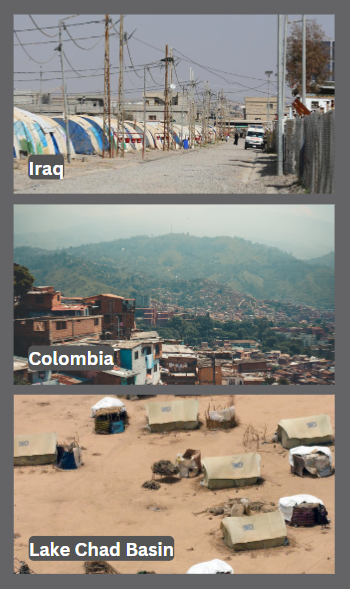
High-level opening with USG Lacroix
The conference opened with a high-level gathering at the UN headquarters on 27 March 2023, where Under-Secretary-General (USG) Jean-Pierre Lacroix served on a panel discussion on ‘Exit Trajectories out of Armed Groups and Implications for Reintegration Support.’
Responding to the presentations on the lived experiences of those exiting armed groups like Boko Haram, the FARC-EP, and community security militias, USG Lacroix highlighted the clear necessity for evidence-based interventions that are tailored to national capacities and operational challenges and implemented across the entire peace continuum.
The USG also lauded the MEAC project for its efforts to support the UN and national authorities as they seek to adopt empirically-based and innovative approaches to addressing conflict and stressed the importance of continued support to expand the implementation and scope of the project’s work.
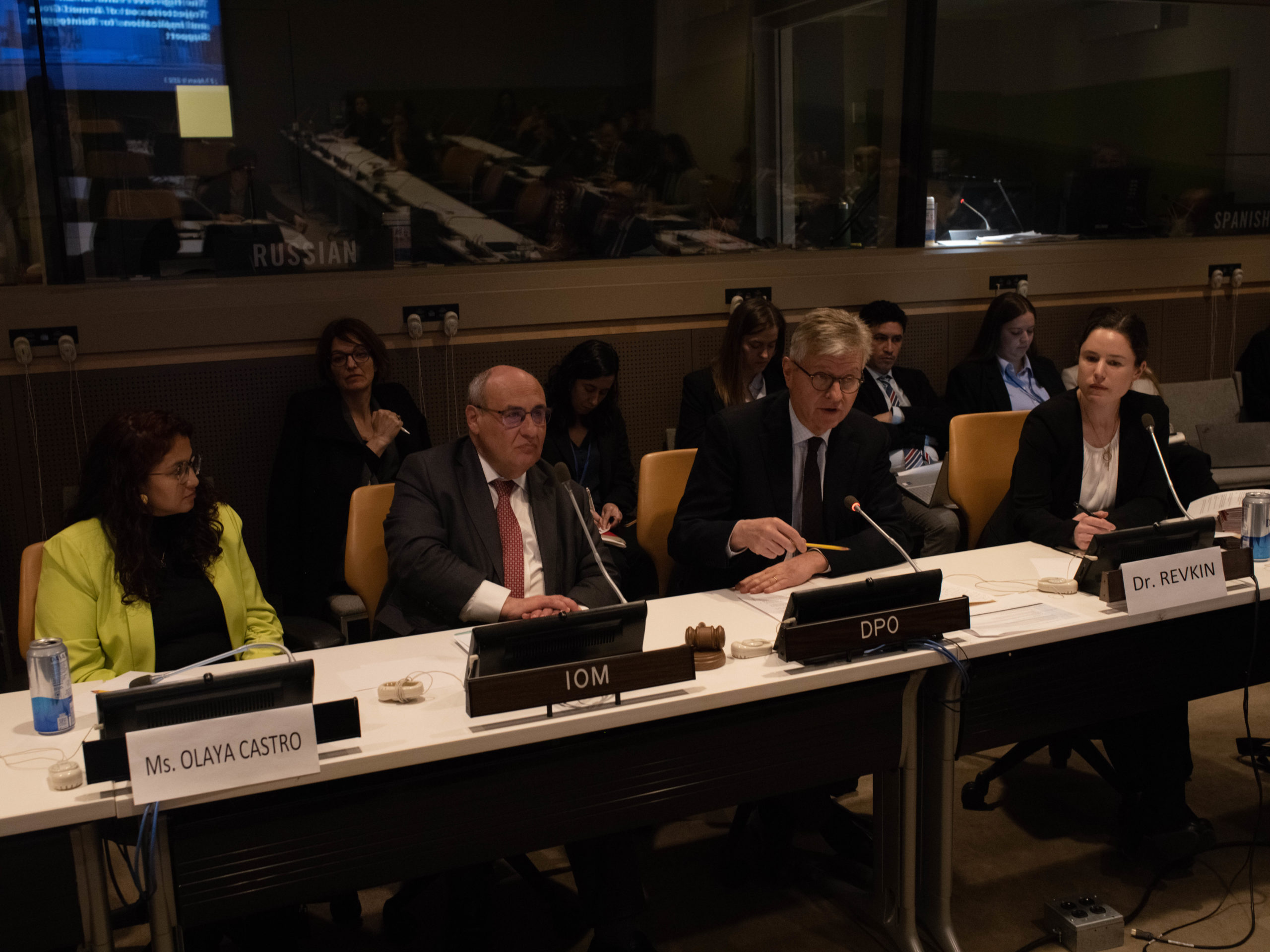
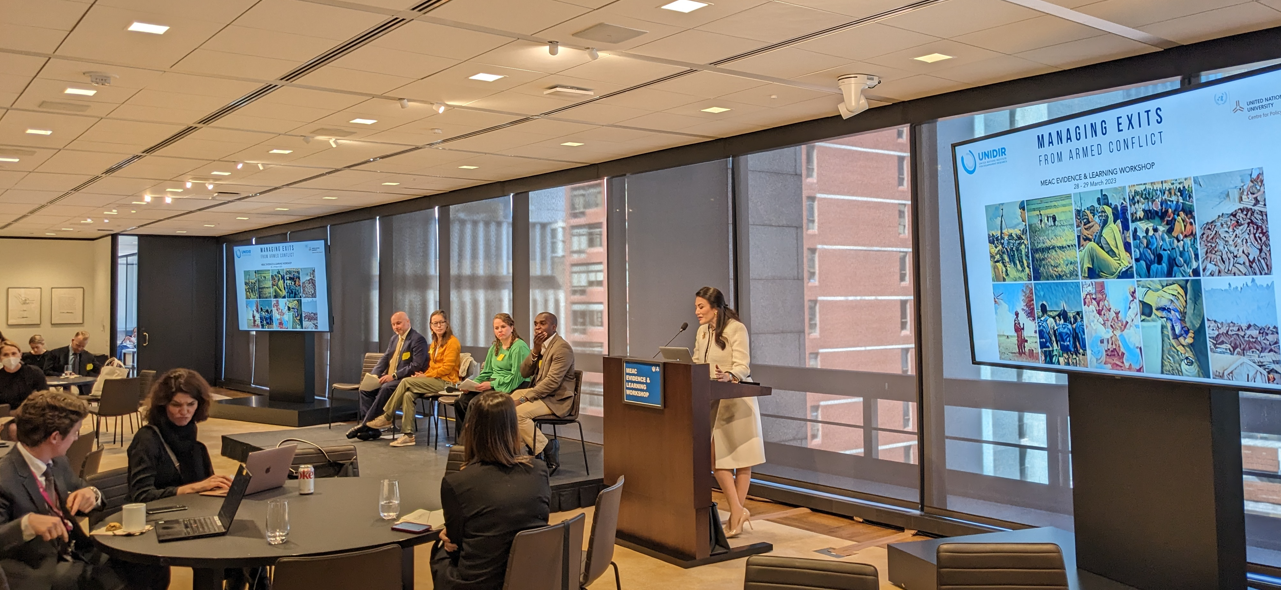
Watch the MEAC high-level event
A recording of the high-level opening, held on 27 March 2023, is available on the UN website.
regional dimensions of DDR
Weapons and Ammunition Dynamics in the Lake Chad Basin
The Lake Chad Basin is affected by widespread illicit arms circulation which represents one of the primary conflict drivers across countries in the region. The bulk of the material is sourced from diversion from national stockpiles and legacy military armaments used by non-state actors in previous conflicts, as well as craft production.
The development and implementation of sound arms control activities as part of an integrated DDR process can contribute to the success of processes as well as to the overall implementation of the Regional Strategy for the Stabilization, Recovery and Resilience (RSS) of the Boko Haram-affected areas of the Lake Chad Basin Region.
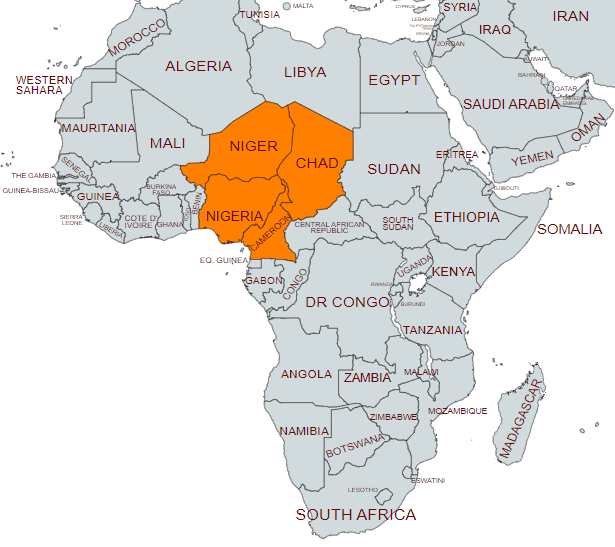
Joint study on Weapons and Ammunition Dynamics in the Lake Chad Basin
The Department of Peace Operations (DPO) and the Office for Disarmament Affairs (ODA), in collaboration with the Lake Chad Basin Commission, conducted an in-depth analysis of conflict dynamics, normative frameworks and national capacities.
The study provides an overview of current regional/subregional weapons and ammunition dynamics in the Lake Chad Basin and aims to identify potential areas of intervention on DDR- related WAM, including cross-border engagement, as part of the RSS.
Development of a National DDRR Strategy in Chad
Boko Haram’s armed violence in the Lake Chad Basin has caused immense suffering for over a decade, resulting in a multidimensional crisis with unprecedented social, political, security, and humanitarian implications for the region and beyond.
National authorities have adopted legal, policy and institutional frameworks for dealing with former associates of Boko Haram factions and facilitating their rehabilitation and reintegration. The government has taken measures for the development of a legal and institutional framework auspicious for Disengagement, Disassociation, Reintegration and Reconciliation (DDRR).
Attending request from the DDRR Steering Committee in Chad, IOM, in collaboration with DPO and BICC, organized a capacity building workshop from 5 to 9 December 2022. The aim was to support the development of the national DDRR strategy for former associates to Boko Haram and the Islamic State – West Africa Province (ISWAP). Important international and regional actors contributed with their expertise and experiences from their work in the Lake Chad Basin.
IOM and DPO conducted a follow-up conference with national authorities from 27-31 March 2023.
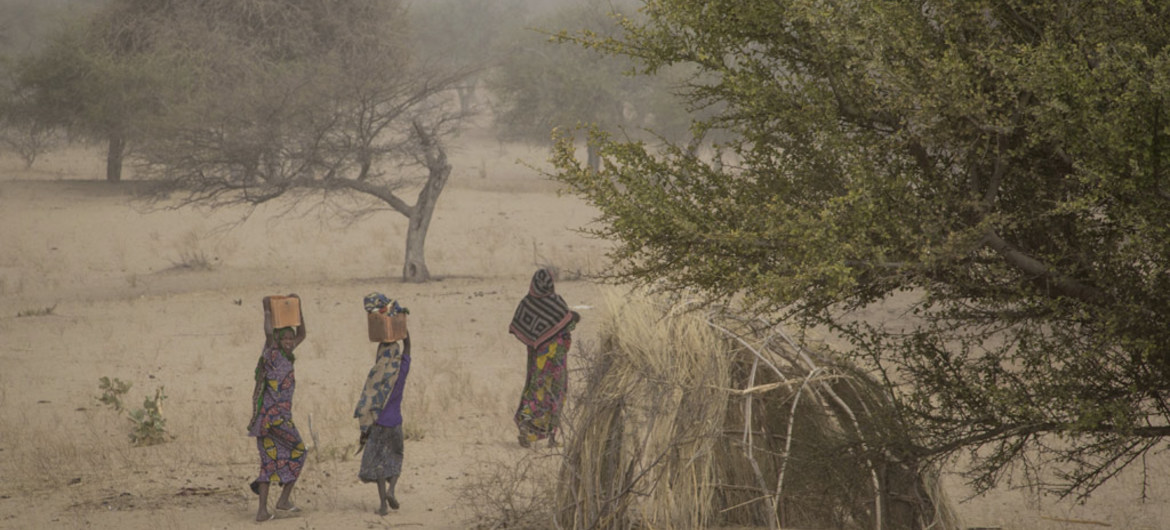
Needs assessment for the Great Lakes
The Contact and Coordination Group (CCG) is a mechanism of non-military measures established by five signatory countries of the Peace, Security, and Cooperation Framework: Burundi, DRC, Rwanda, Tanzania, and Uganda. The CCG offers an opportunity to all foreign armed groups operating in DRC to return safely to their country of origin, providing political and security guarantees as well as socioeconomic opportunities for ex-combatants who leave voluntarily. The armed groups’ representatives expressed general interest in the initiative and identified socioeconomic integration opportunities as a key factor.
Against this backdrop, a team – composed of the United Nations (DPPA-DPO/CSAD, DPO/OROLSI/DDRS and O-SESG-GL) and the Folke Bernadotte Academy (FBA) – conducted a needs assessment mission from 23 March to 2 April 2023. The mission aimed to assess Uganda, Burundi, and Rwanda’s readiness to receive and effectively reintegrate former combatants of foreign armed groups operating in Eastern DRC. During the assessment, they met with national authorities, UN partners, civil society organizations, and ex-combatants.
Findings of the assessment team:
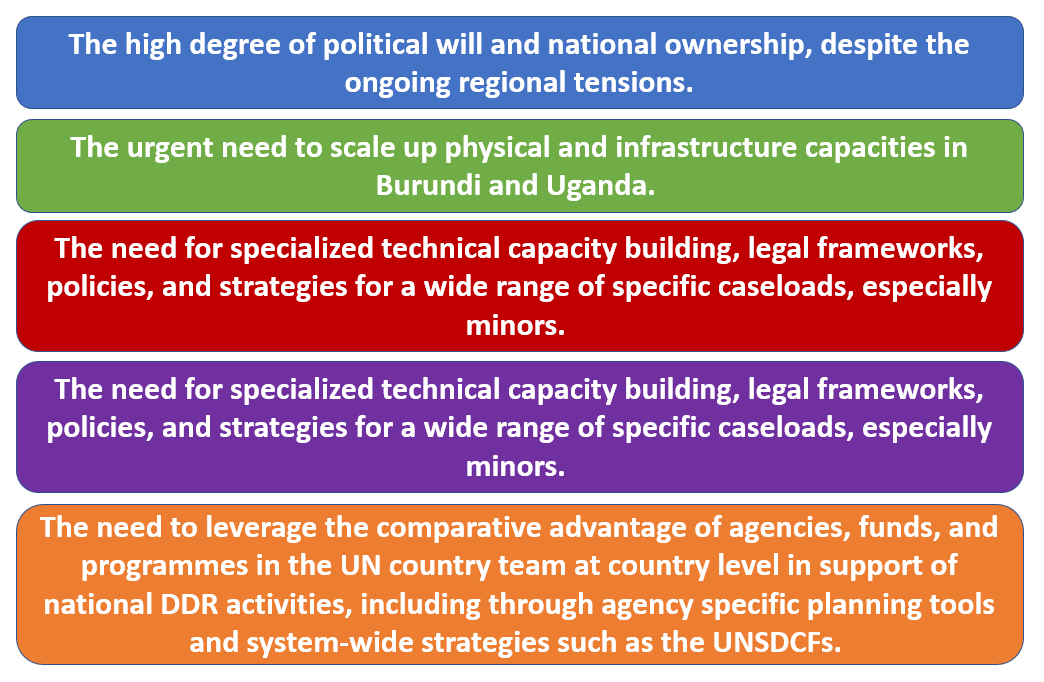
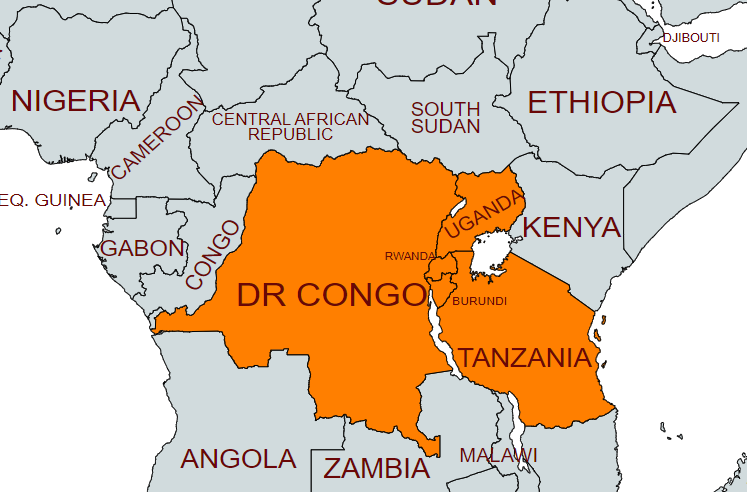
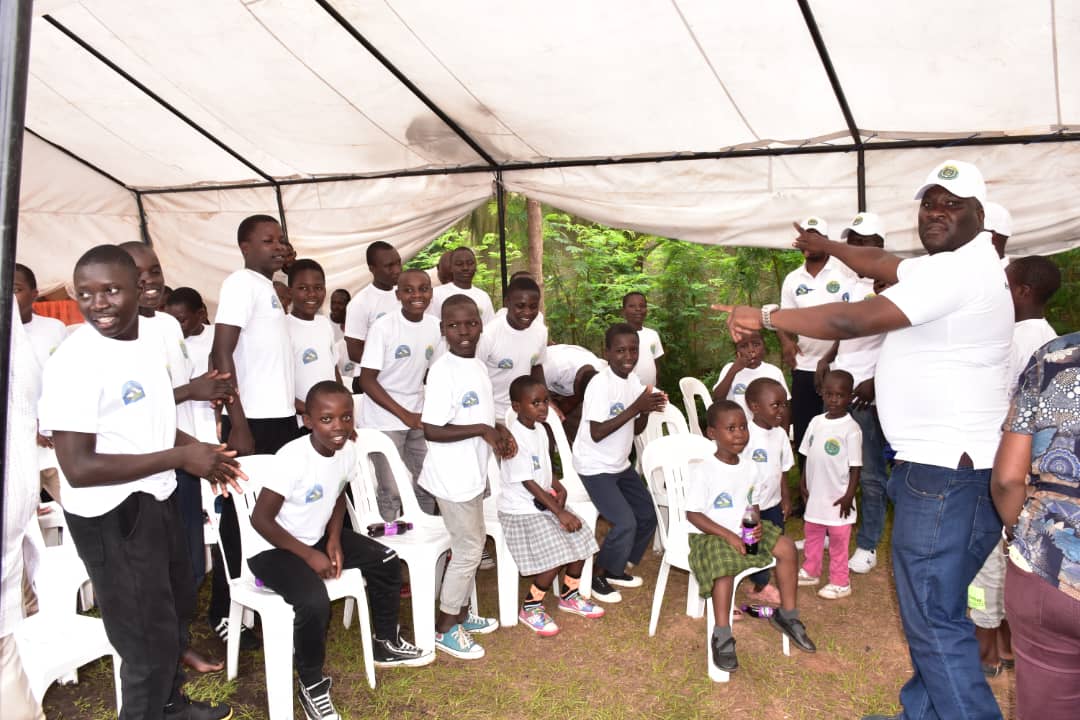
Field updates

Read the updates for each country
Click on the country name to learn more about updates from January to April 2023.
Cameroon
In late March, the DDR Section (joined by the Deputy Head of DDR in MINUSCA) supported an introductory DDR training for national stakeholders in Yaounde, Cameroon. IOM, WHO, UN Women and UNICEF also assisted with the training.
Capacity building had been a key request of the National DDR Committee. Discussions among stakeholders revealed a broad range of positions of the national actors regarding key aspects of the conflict and recovery in Cameroon, including on the divergent nature of conflicts, presidential amnesty and necessary legal frameworks.
Central African Republic
In early February, MINUSCA DDR, in coordination with the UEPNDDRR, carried out physical verification of 52 combat weapons which had been handed over to the UEPNDDRR by “other security personnel”.
On the 23 and 24 February, a high-level delegation, led by the Prime Minister and the SRSG MINUSCA conducted a field mission to Bria and Sam Ouandja, to visit DDR and CVR projects in the locality and assess first-hand the pivotal role played by CVR in the restoration of peace and state authority and in enhancing the social cohesion of local communities.
The following official statistics were presented by the General Coordinator of the UEPNDDR during 14th regular session of the Comité Exécutif de Suivi of the CAR Political Agreement:
-
a total of 4,708 ex-combatants from the 14 APPR-signatory armed groups were disarmed and demobilized since the launch of the PNDDRR including 480 ex-combatants that were disarmed and demobilized during the DDRR pilot phase in CAR,
-
a total of 1,754 ex-combatants and 1,000 youth prone to violence had been reintegrated through the World Bank funded socio-economic reintegration programme PREC and 1,218 more are in the process of being reintegrated;
-
there are plans to disarm and demobilise a further 1,000 elements in the South-East, North-East, North-Ouest and the surroundings of Bangui.
On 31 March, the meeting of the Comity Technique d’Intégration des ex-combatants was held, chaired by the SSR Minister Counsellor, General Ouayolo, in the presence of MINUSCA DDR. Issues of reintegration, integration into security sector (and potential double benefit by ex-combatants trying to benefit from both) and USMS were discussed.
On 13 April, 12 demobilized combatants reached Bangui, the first part of a larger group of 112 to be integrated into the national police and gendarmerie within the framework of the ongoing recruitment process. The GoCAR is seeking the recruitment of overall 500 police and 500 gendarmerie elements.
Chad
In late March, DDRS supported – together with IOM Chad and the Bonn International Centre for Conflict Studies (BICC) – the Chadian DDRR Steering Committee in the design of a national strategy « pour le désengagement, dissociation, réintégration et réconciliation (DDRR) des anciens associés á Boko Haram et l’EIAO ». Based on the principle of national and local ownership, members of the Steering Committee discussed and agreed on guiding principles and key aspects following a capacity building workshop in December 2022.
Haiti
Between 28 February and 02 March, the DDR Section co-organized and facilitated a strategic consultation “Towards a Coordinated and Common Approach to Community Violence Reduction (CVR) in Haiti”. You can find more information about this workshop below.
In April, funding was approved for the BINUH CVR project “Vers un engagement des acteurs pour la réduction de la violence communautaire dans les quartiers à risque”. This initiative aims to reduce the hold of armed groups on communities in ‘buffer zones’ and the instrumentalization of young men and women. This will be achieved through dedicated support to the Task Force on DDR-CVR. Furthermore, the initiative will support socio-economic recovery measures, including income-generating activities and rehabilitation of community infrastructure to strengthen the resilience of these zones to violence.
Mali
On 1 February, in Timbuktu, as part of its efforts to promote and strengthen national ownership, the SSR-DDR section organized a capacity-building workshop for local implementing partners of CVR projects. Representatives of 26 local NGOs/Community Based Organizations were in attendance. The workshop focused on various stages of implementation and management of CVR projects. MINUSMA is currently the only peacekeeping operation in which CVR projects are exclusively implemented by local NGOs or CBOs.
From 6 to 9 February 2023 in Mopti, the SSR-DDR section organized a capacity-building workshop for 23 representatives of local NGOs and CBOs. In the past three years, in spite of the pandemic, the section successfully implemented with its local partners over 70 CVR projects in Gao, Kidal, Mopti and Timbuktu and it is expected that an additional total of 35 projects will be implemented this year.
In preparation of the launch of the pilot project on the reintegration of 900 women associated with armed groups, MINUSMA/SSR-DDR Section initiated trainings of UN and non-UN staff on the biometric registration of ex-combatants. On 15 and 16 February, the Section conducted trainings in Gao and Kidal for members of the National DDR Commission and MINUSMA regional staff expected to participate in the registration operations. Additional trainings are expected to be conducted in Timbuktu and Mopti.
Sudan
On 5 January, DDRS held an in-depth discussion with UNITAMS DDR expert and UNDP Senior expert on the implementation of the DDR process in Sudan. The meeting served to highlight challenges, operational opportunities and political sensitivities in supporting existing DDR bodies and the need to comply with provisions of the Juba Peace Agreement.
On 10 January, DDRS briefed the Panel of Experts for Sudan on the challenges and opportunities for the implementation of the DDR process. Among other topics, DDRS stressed the need to advance with the establishment of the DDR institutional framework, the national DDR strategy as well as coordination mechanisms. The new process should focus on promoting an integrated approach, ensuring oversight at all stages and consolidating partnerships.
On 12 January, DDRS facilitated a briefing of UNITAMS DDR expert and DPPA-DPO Sudan team. The meeting served to update counterparts and address questions. DDRS and UNITAMS stressed that the current DDR process should go beyond DDR programmes, acknowledging UNITAMS mandate on WAM and CVR.
Yemen
In early March, Yemen DDRS participated remotely in the first session of the revitalized working group on DDR. The work will be focusing on possible pre-DDR plans for after the cessation of hostilities, drawing parallels to what is currently planned for Libya.
DDR Section/ Regional
From 06 – 17 February, DDRS supported the annual DDR foundation training course that took place at the Kofi Annan International Peacekeeping Training Centre (KAIPTC) in Accra, Ghana. 5 female and 12 male participants originating from Burkina Faso, Cameroon, Ghana, Haiti, Ivory Coast, Mali, Nigeria, and the Gambia, including staff working with MINUSMA and MONUSCO, learned through interactive sessions and adult learning methods the basics of DDR. This support followed a request from KAIPTC, and is part of the support of DDRS to members of the Integrated DDR Training Group (IDDRTG).
Between 15 to 17 February, the DDRS chief participated in the Wilton Park dialogue on the Reintegration of children associated with armed forces or armed groups, co-organized by OSRSG for Children in Armed Conflict, the Norwegian Ministry of Foreign Affairs, UNICEF, Save the Children and War Child. The discussion focused on child reintegration, preparing children who come out of armed conflict for the future, and funding modalities.

Spotlight: A common vision for community violence reduction in Haiti
Between 28 February and 2 March, the DDR Section co-organized and facilitated a strategic consultation towards a coordinated and common approach to community violence reduction in Haiti.
The first of its kind, the consultation brought together entities within the UN system present in the country, including BINUH, the UN Resident Coordinator Office, World Bank, as well as UN agencies, funds, and programmes.
They discussed the risks, conflict dynamics, and coordination challenges in the implementation of CVR under the current circumstances in Haiti. Participants took stock of lessons learned from decades of programming on CVR and the opportunities presented by some armed gangs expressing interest in a ceasefire.
The consultation ended with a summary of key findings and recommendations for priorities in the short, medium, and long terms.
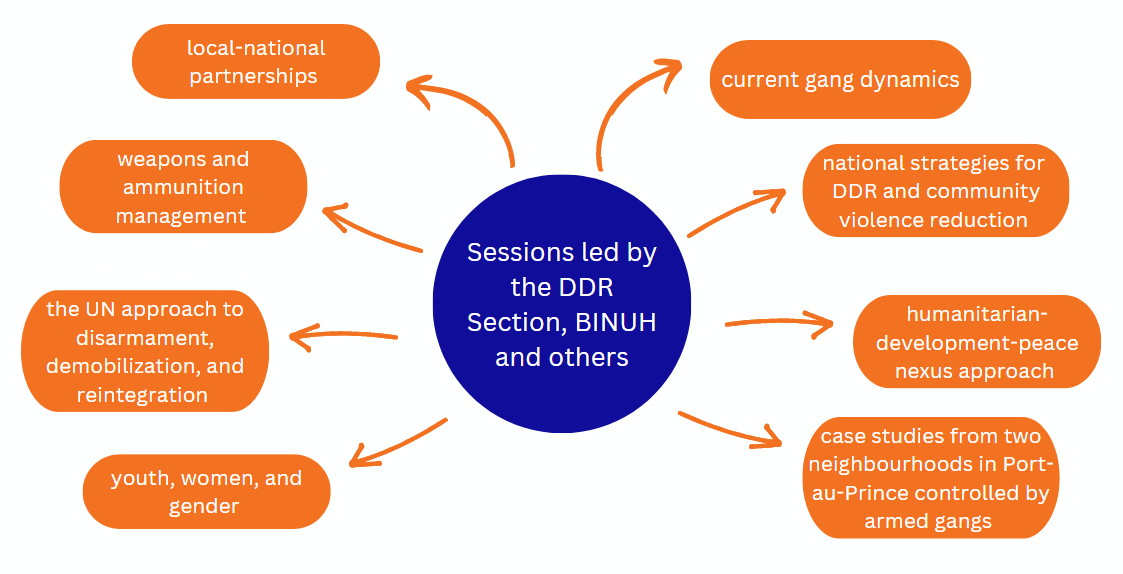
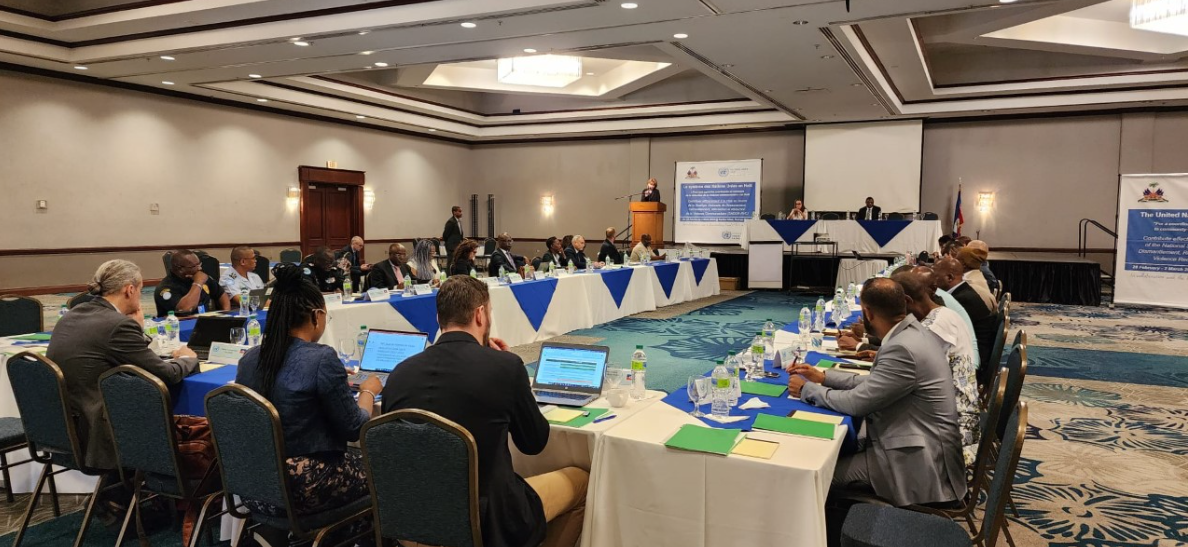
Introduction of new staff members
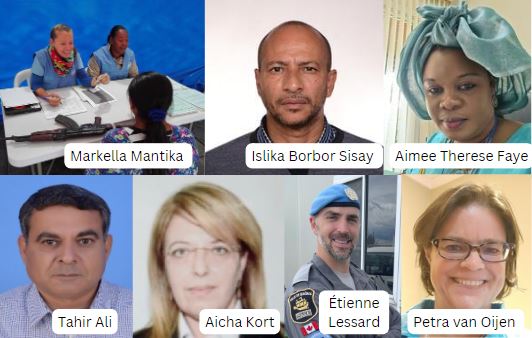
Markella Mantika
Markella joined the UN DPO DDR Section in New York in March 2023. She works as DDR Policy and Planning Officer.
From 2016-2021, Markella worked on the Colombian peace process initially monitoring the cessation of hostilities and leading laying down of weapons operations. While providing good offices to the Colombian Truth Commission, Special Jurisdiction for Peace, local and ethnic communities/social leaders, she facilitated dialogue on local reconciliation efforts and verified the implementation of the peace agreement through socioeconomic and political reincorporation and transitional justice mandate aspects.
Since 2011 she served in peacekeeping (Côte d’Ivoire, DRC, Liberia) on disarmament (sanctions, arms embargo), mine action, rule of law and crisis management operations. With the EU and OSCE she followed electoral processes in northern Nigeria, Sierra Leone, Honduras, Paraguay, Peru, Myanmar and Azerbaijan. She also worked with Mines Advisory Group in Burundi and at the Embassy of Greece in Washington, D.C.
Islika Borbor Sisay
Islika is presently the DDR Advisor with UNITAMS (Sudan).
He has worked in Sudan, Afghanistan, and Sierra Leone as a DDR practitioner for more than 15 years. Islika was a co-recipient of the 2014 UN 21 Award in October 2014 with UNAMID. Islika has published two policy practice briefs (PPB) on Community Stabilization and SALW control in Darfur in the academic journal “Academia Letters” (2022) and the African Centre for the Constructive Resolution of Disputes (ACCORD), in September 2022. Islika has a BSC from the University of Sierra Leone, an Executive Masters from the SDA Bocconi School of Management, Milan, and a MSC from SOAS, University of London.
Aimee Therese Faye
Aimee recently joined BINUH (Haiti) as Senior DDR-CVR Officer.
She joined BINUH, Haiti from the Political Affairs Division of MONUSCO. She has 16 years of experience in disarmament, community violence reduction projects, political affairs, and countering violent extremism.
She is a Cheikh Anta Diop University graduate specializing in gender and development communication. She has worked in MINUSTAH, UNOCI, MONUSCO, and MINUSMA, and has contributed to regional initiatives (Multinational Joint Task Force in the Lake Chad Basin and Regional Force Initiative with the East African Community’s political and military track in DRC).
She has inter-agency experience with UNDP, UNOPS, UNIDO, and UNIDIR as a consultant and led the launch of the MOC in Gao as well as the IOM disengagement program in Chad for former Boko Haram affiliates.
Tahir Ali
Tahir Ali recently joined UNSOM (Somalia) as Chief DDR.
Mr Tahir Ali, a national of Pakistan, joined United Nations Assistance Mission in Somalia (UNSOM) as Chief Disarmament, Demobilization and Reintegration (DDR) section in Rule of Law and Security Institution Group (ROLSIG).
Mr Tahir has more than 13 years of professional work experience in UN peacekeeping missions and development programmes, with a focus in the areas of DDR, strategic planning and operations, weapons and ammunition management and project management having served in UNOCI, UNMIS, UNMISS and MINUSMA.
Mr Tahir holds a Masters’ Degree in Business Administration and Bachelor’s Degrees in Strategic Defence Studies and Political Science.
Aicha Kort
Aicha serves as SSR-DDR Team Leader at MINUSMA (Mali).
Aicha spent 25 years serving as Senior Public Policy Adviser with security and defence institutions implementing international bilateral and multi-lateral strategic security programmes. She led the process of developing the first national Multilateral Security and defence coordination matrix aimed at building consensus among multiple sectors of governance around SSR priorities and participated in drafting and discussion of national laws on defence and security.
During her tenure in the UN system, she was personally engaged in emerging, negotiating and monitoring SSR-DDR programs focusing on issues related to institutional reforms and security governance.
She holds a master’s degree in public administration ENA High school – Tunis, Master’s degree in legal sciences and specialized diploma in administrative, international and political studies from the University of Carthage. She speaks Arabic, French, English and Italian.
Étienne Lessard
Étienne is the new French Canadian UNPOL assigned to the DDR section for the MONUSCO at GOMA (DRC).
This is his first UN mission and he is honored to join the DDR section. Étienne has worked as police officer for the Quebec City department since 2011. In his many years of policing, he had the opportunity to help many citizens to rehabilitate from a life of crime, drug abuse or sex work. Nevertheless, dealing with ex-combatants is new for him. Since 2005, Étienne has also been a reservist into the regiment Les Voltigeurs de Québec, an infantry unit inside the Canadian army force.
He believes that with his experience, hard work and the help of colleagues, he will become an active member of the section and the mission.
Petra van Oijen
Petra joined the UN Office to the African Union (UNOAU) in early 2023. She works as SSR officer and covers the DDR portfolio.
Petra van Oijen has over seventeen years of experience in the areas of SSR, training, and peace and conflict. During this period, she held several advisory positions including at UNSMIL as well as the EU mission EUCAP Sahel Niger, and worked for Strategic Capacity Group, the Netherlands Ministry of Foreign Affairs, DCAF/ISSAT and the Netherlands Ministry of Defence.
She has experience related to several countries in Africa and Latin America, including Niger, Mali, Burundi, Central African Republic, North Africa (e.g., Libya), Colombia, the Caribbean, and Iraq.
IDDRS UPDATES
On 16 March 2023, the UN entities members of the Inter-Agency Working Group (IAWG) on DDR came together for this year’s first quarterly meeting. The IAWG’s main focus for 2023 will be a lessons learned exercise of the Integrated DDR Standards (IDDRS) review process as well as the operationalization of the IDDRS. The Lessons Learned Exercise on the review of the IDDRS from 2017 to 2023 will independently evaluate the review process and compile lessons learned and feedback from IAWG members.
The operationalization includes disseminating the updated standards with practitioners in the field to support work on the ground.
Three modules have been validated by the IAWG members since January 2023: IDDRS 5.40: Cross-Border Population Movements; IDDRS 5.70: Health and DDR; and IDDRS 6.10: DDR and SSR.
Three modules remain to be finalized: IDDRS 5.10: Women, Gender and DDR; IDDRS 6.20 Transitional Justice and DDR; and IDDRS 6.50 Armed Groups Designated as Terrorist Organizations.
Planning is underway for a high-level event to be held in June with participation of Member States on the topic of DDR and the revised IDDRS.
IDDRS Modules Status
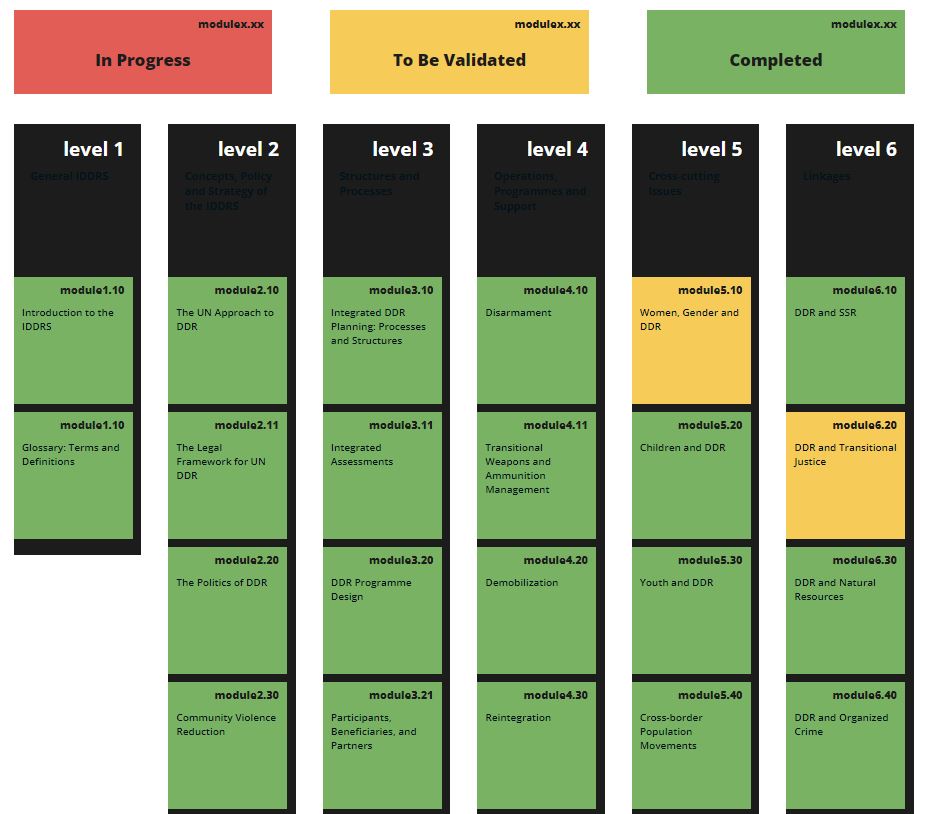
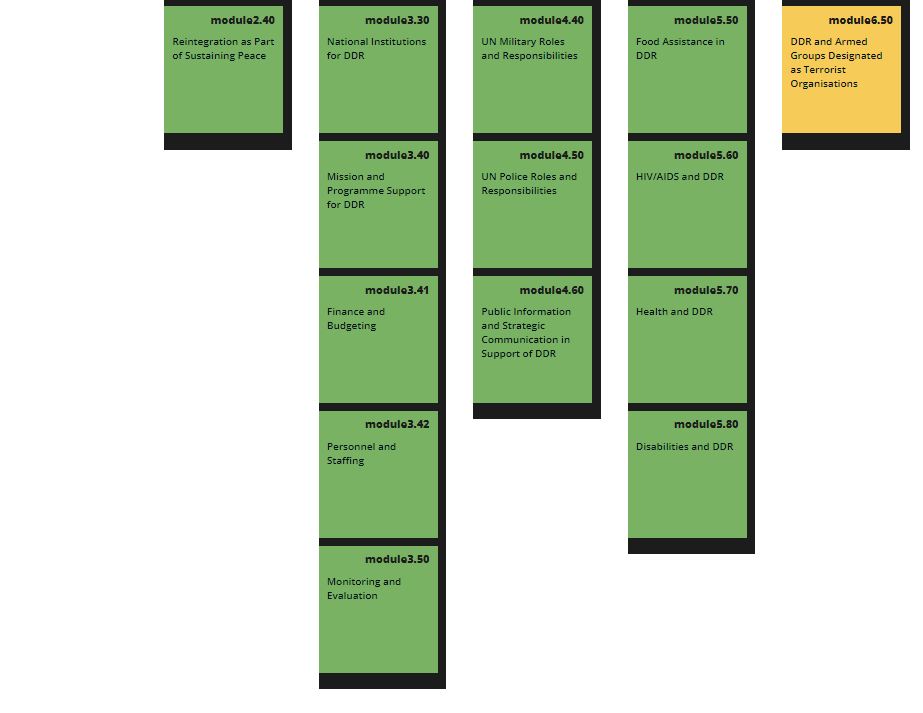
Recent publications
Journey to extremism in Africa: Pathways to recruitment and disengagement
The surge in violent extremism in sub-Saharan Africa undermines hard-won development gains and threatens to hold back progress for generations to come. The need to improve understanding of what drives violent extremism in Africa, and what can be done to prevent it, has never been more urgent.
Against this backdrop of the surge in violent extremism in sub- Saharan Africa, and the continued prioritization of security-driven responses, UNDP initiated a follow-up study, Journey to Extremism in Africa: Pathways to Recruitment and Disengagement in 2020.
The research was developed to strengthen and refine the evidence base established in 2017, as well as to update and expand the scope of the research, tracking variations in relation to the findings of the first report: Journey to Extremism in Africa: Drivers, Incentives and the Tipping Point for Recruitment
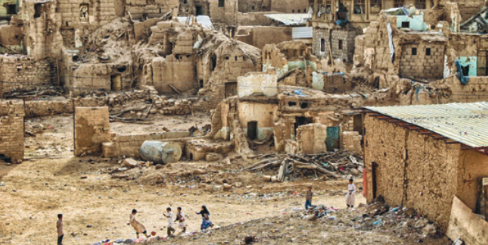
Reducing Civilian Harm in Urban Warfare: A Commander’s Handbook
The handbook identifies the extent of civilian harm resulting from combat taking place in urban areas.
It highlights those aspects of the Law of Armed Conflict which are particularly relevant in urban areas. It presents to military commanders at brigade and battalion level a series of examples of good practice to reduce civilian harm, grouped under the headings of doctrine; training; planning and conduct of operations. It also offers specific guidance on operations that might not be conducted routinely by armed forces, such as planning and conducting evacuations and the screening of populations.
It is relevant to commanders in state armed forces worldwide, particularly those involved in writing doctrine, overseeing training or planning for combat in urban areas.
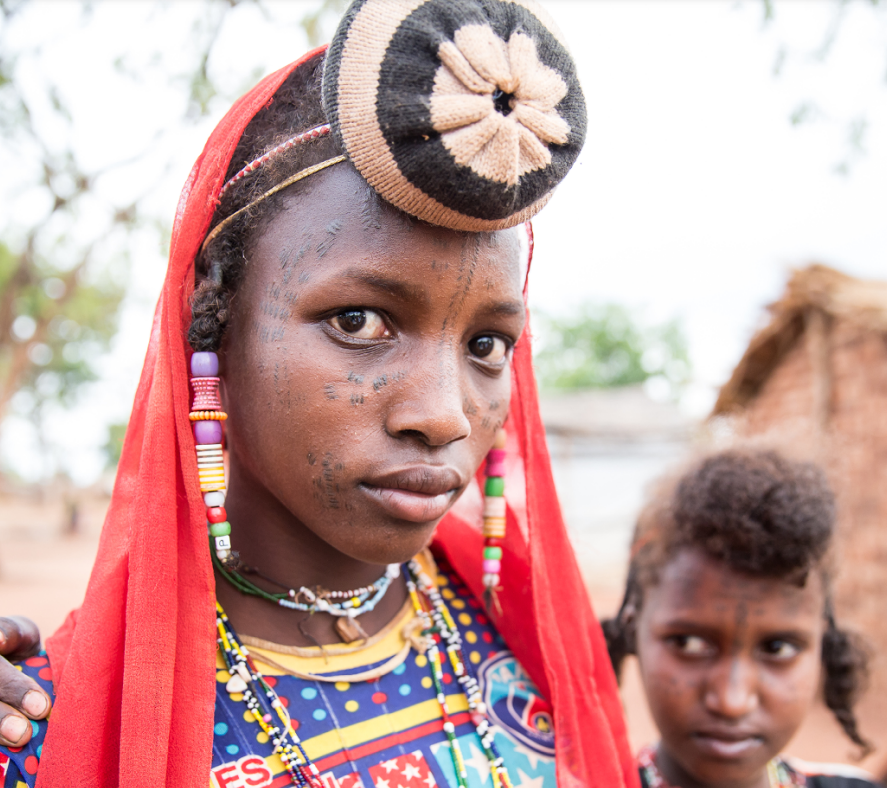
Gendered Dimensions of Disengagement, Disassociation, Reintegration and Reconciliation: Chad
Over a decade of violent conflict in the Lake Chad Basin region has had profoundly gendered effects. People of all genders have been concurrently involved in the conflict, either voluntarily or forced, most notably as part of community militias or groups such as Jama’atu Ahl al-Sunna li-l-Da‘wa wa-l-Jihad (JASDJ), Islamic State West Africa Province (ISWAP) and similar groups.
IOM, which engages in interventions focused on disengagement, disassociation, reintegration and reconciliation (DDRR) recognizes that a gender-transformative approach, supported by a proper analysis, is essential. Taking a qualitative methods approach that draws on data collected in interviews with both men and women in communities across Chad’s Région du Lac and capital city, N’Ddjamena, this study examines gender dynamics around the DDRR process in the country and presents recommendations to enable gender transformation.
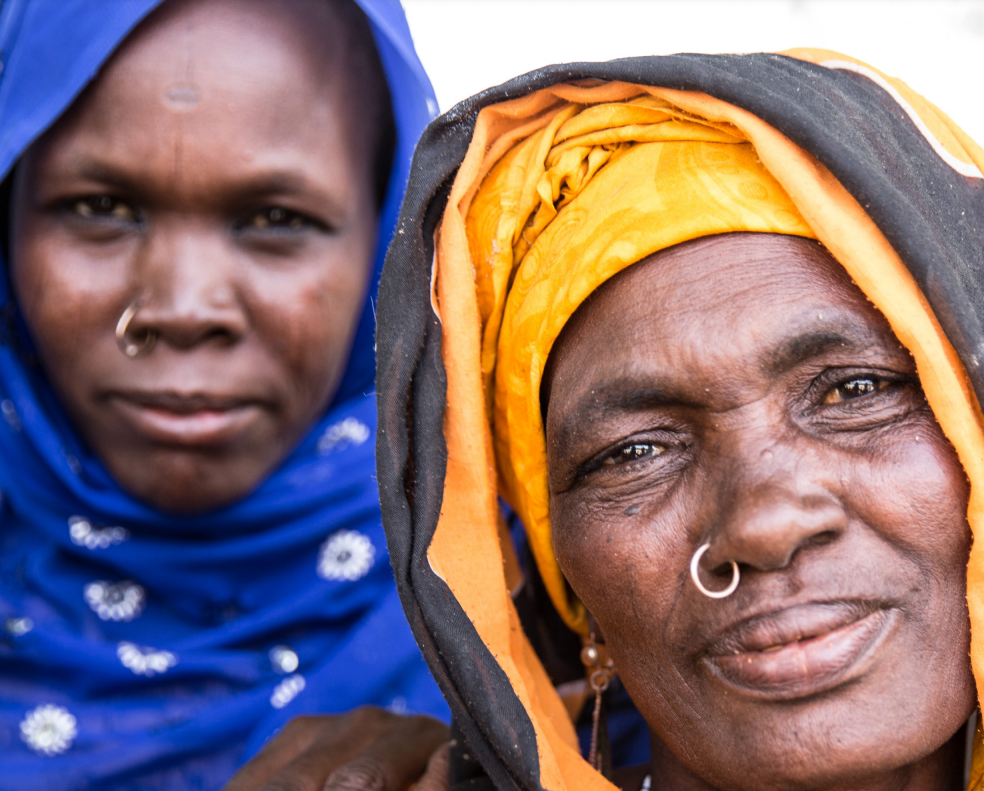
Gendered Dimensions of Disengagement, Disassociation, Reintegration and Reconciliation: The Niger
Over a decade of violent conflict in the Lake Chad Basin region has had profoundly gendered effects. People of all genders have been concurrently involved in the conflict, either voluntarily or forced, most notably as part of community militias or groups such as Jama’atu Ahl al-Sunna li-l-Da‘wa wa-l-Jihad (JASDJ), Islamic State West Africa Province (ISWAP) and similar groups.
IOM, which engages in interventions focused on disengagement, disassociation, reintegration and reconciliation (DDRR), recognizes that a gender-transformative approach, supported by a proper analysis, is essential. Taking a qualitative methods approach that draws on data collected in interviews with both men and women in communities across the Niger’s Diffa Region and capital city, Niamey, this study examines gender dynamics around the DDRR process in the country and presents recommendations to enable gender transformation.
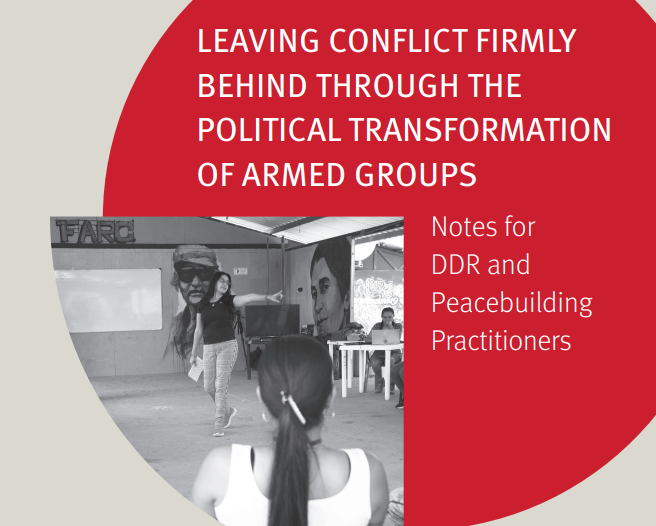
Leaving conflict firmly behind through the political transformation of armed groups: Notes for DDR and peacebuilding practitioners
This report compiles key lessons learnt on the political dimension of DDR gathered through a project jointly conducted by the United Nations Department of Peace Operations (DDR Section) and the Berghof Foundation.
Following an explanatory account of the interlinkages between DDR and political transformation and a series of four country examples from Mali, Colombia, Mindanao/Philippines and Northern Ireland, the report outlines six factors of successful political transformation. These are: sustaining internal cohesion within the transforming groups; favourable peace agreements and other legal frameworks; right timing of transitional justice as a trust-building endeavour; maintaining the political will of the state party to the conflict; promoting gender-sensitive transformation; and ensuring sustainable implementation of the new political settlement.
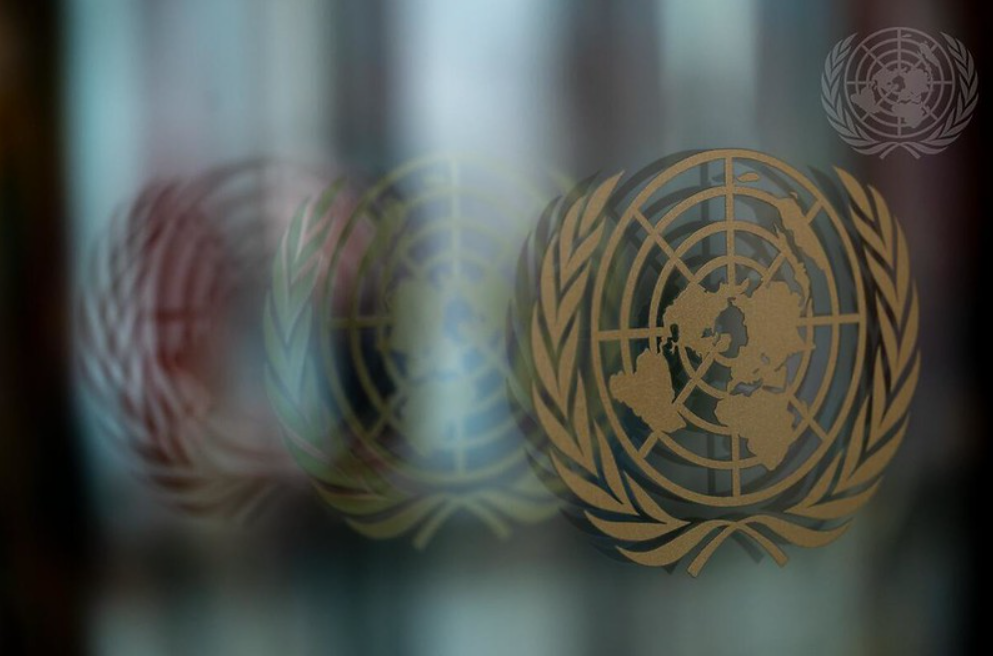
Disarmament, Demobilization and Reintegration: Report of the Secretary-General
The fourth Secretary General report on DDR, published in November 2022, provides an overview of United Nations engagement in disarmament, demobilization and reintegration in the field and at headquarters.
The Report takes stock of the increasingly complex contexts in which DDR takes place and draws on the lessons that have been learned from previous experiences, noting that both the landscape of armed conflict and the types of DDR interventions have evolved significantly in the past decade.
